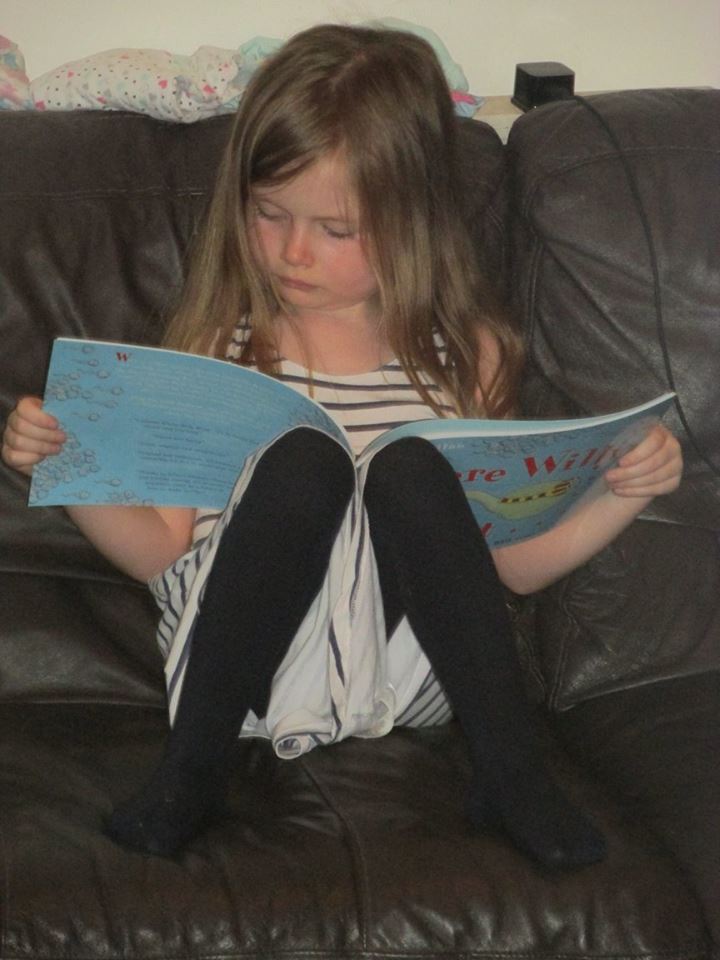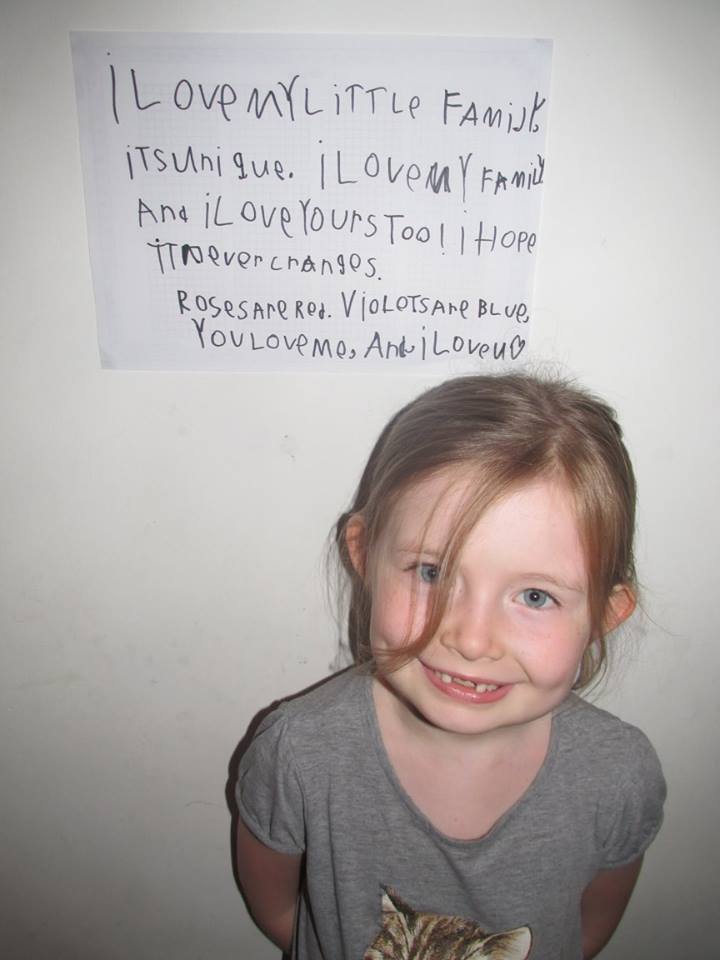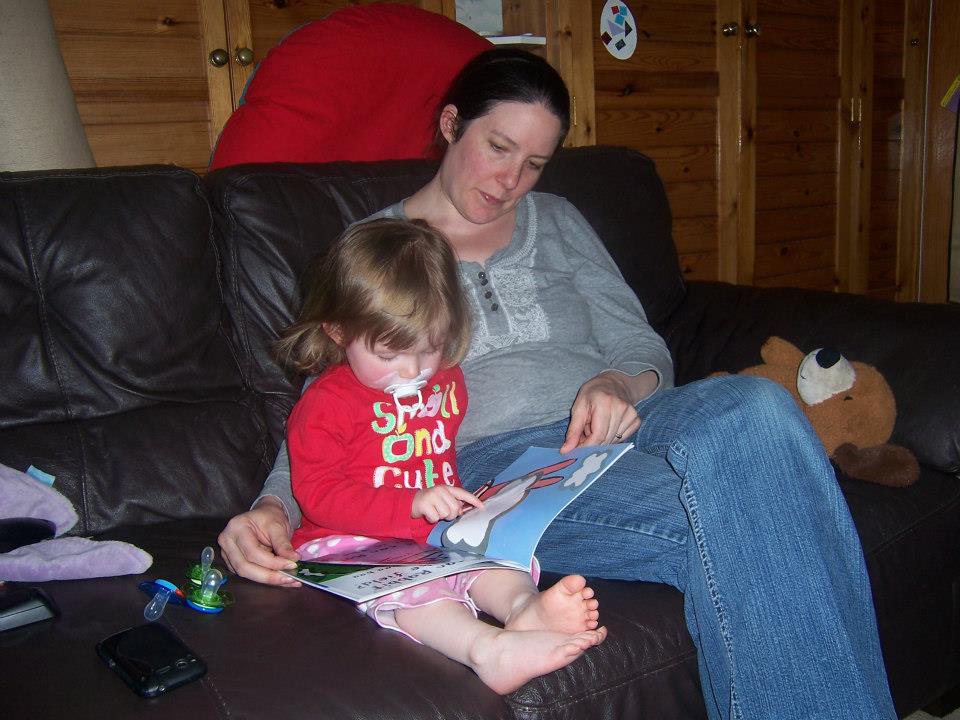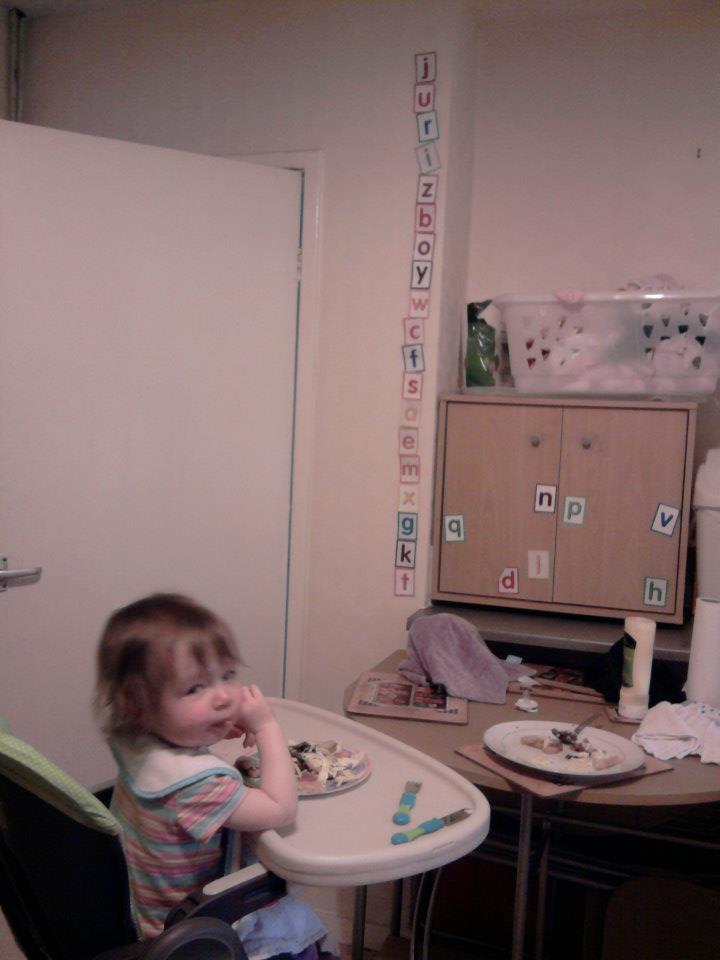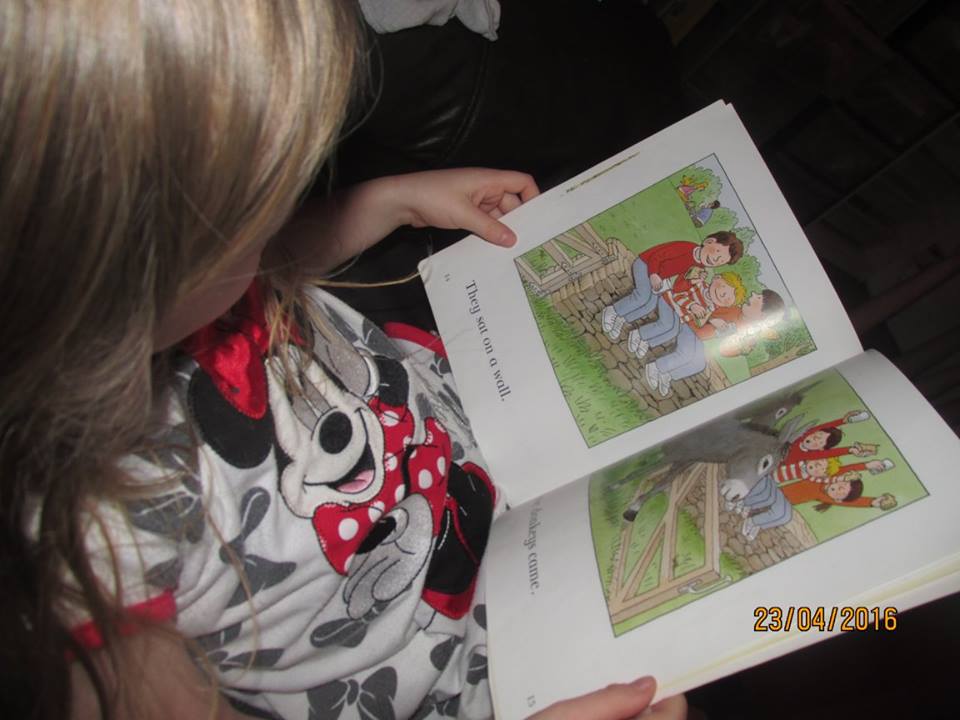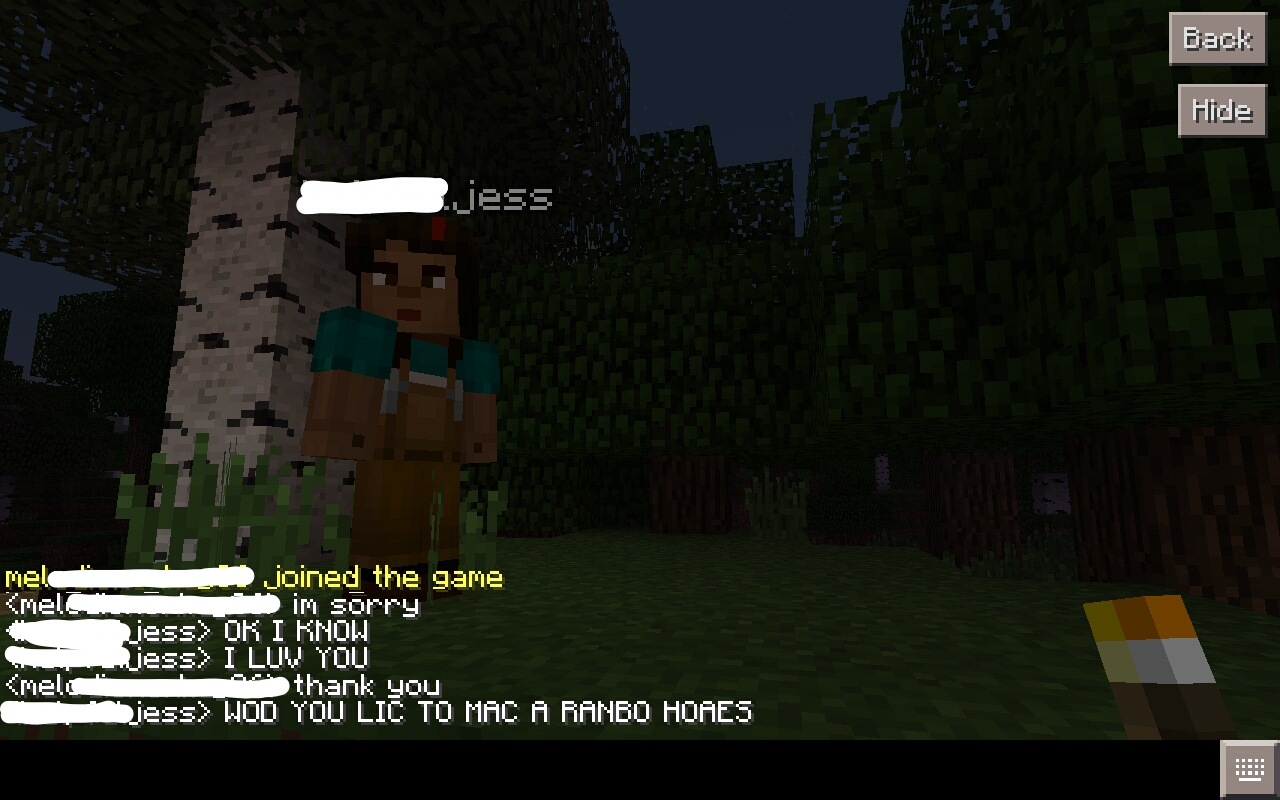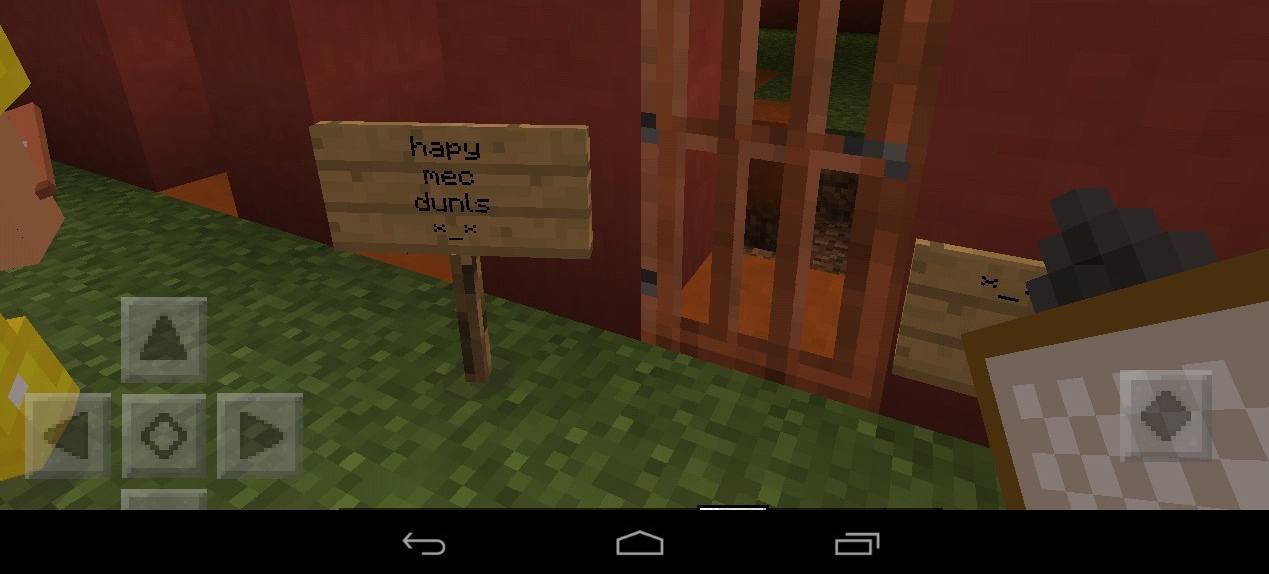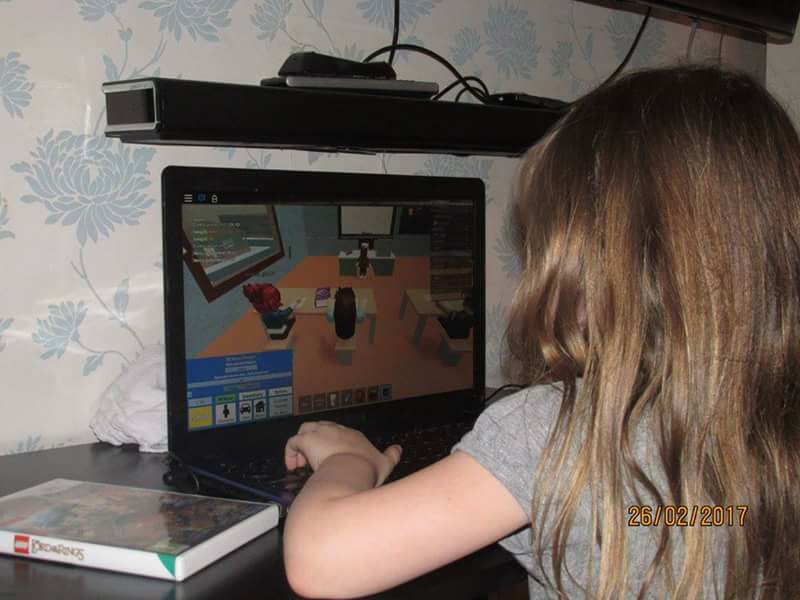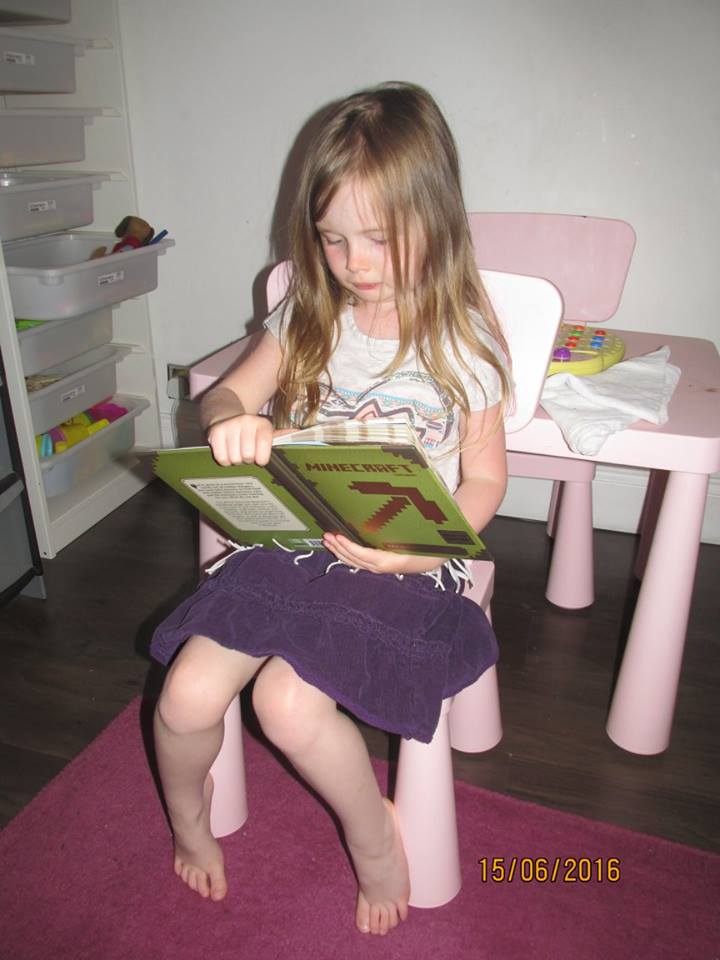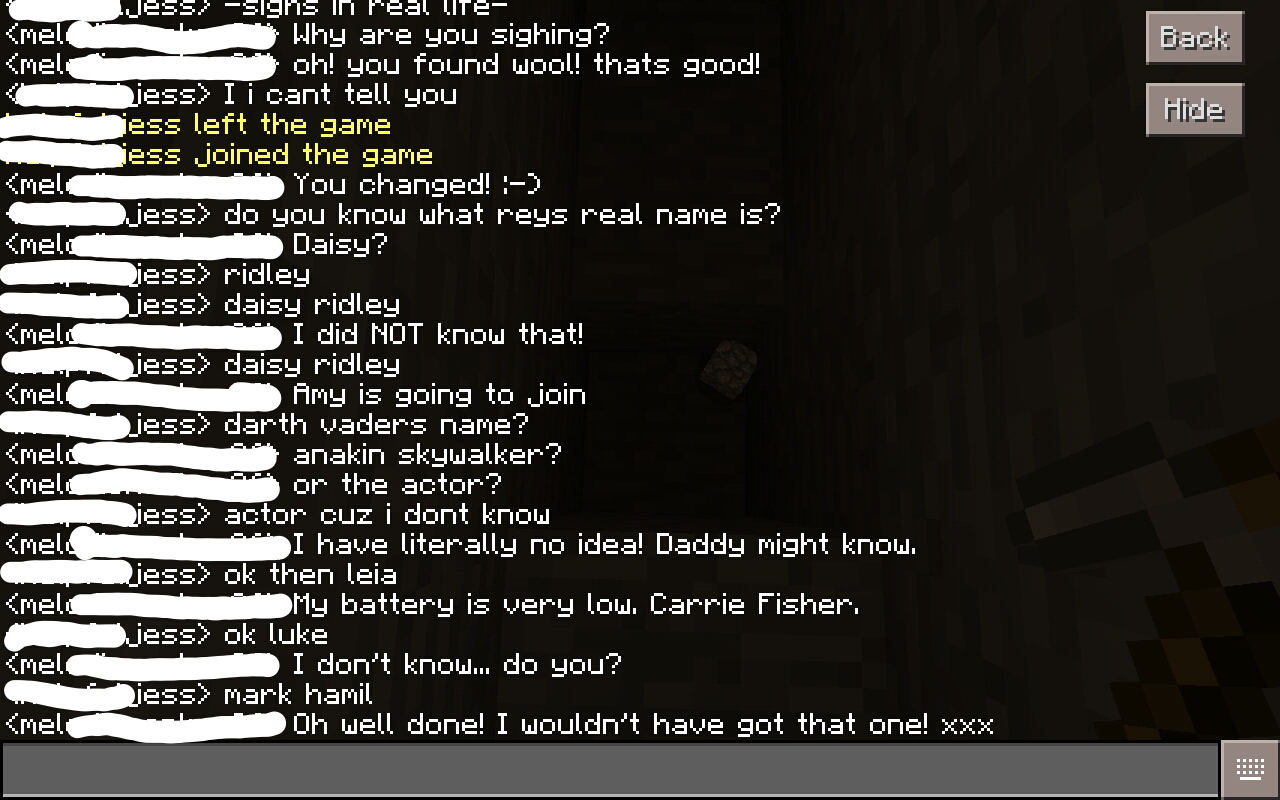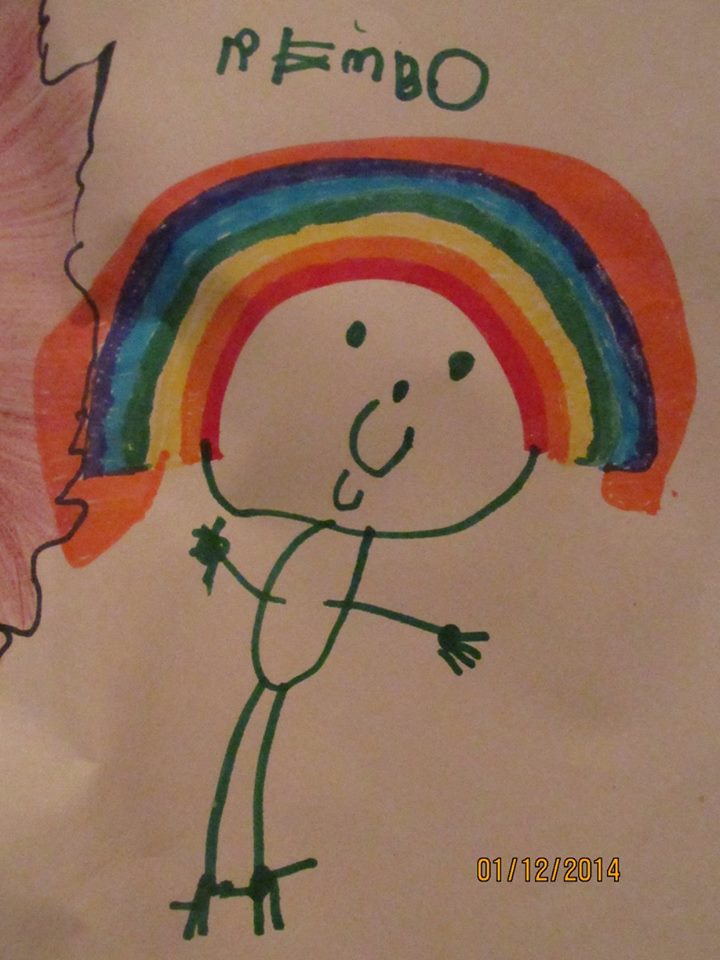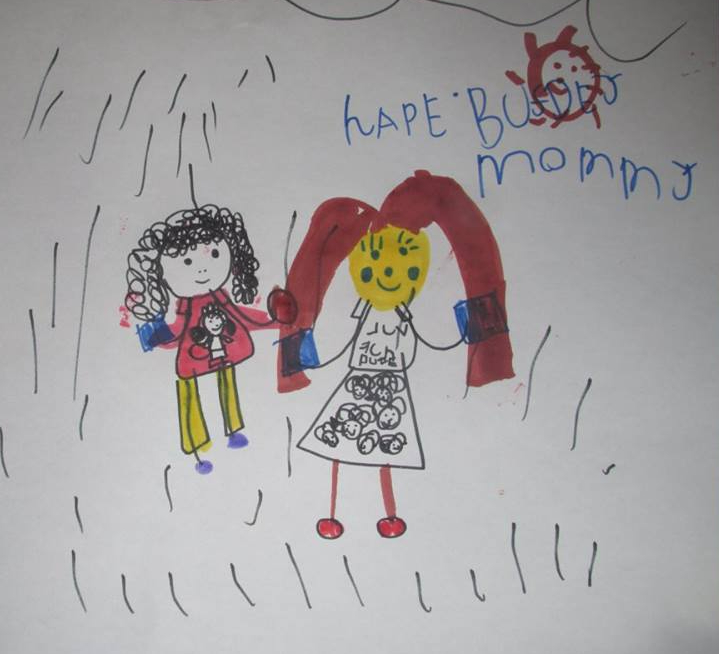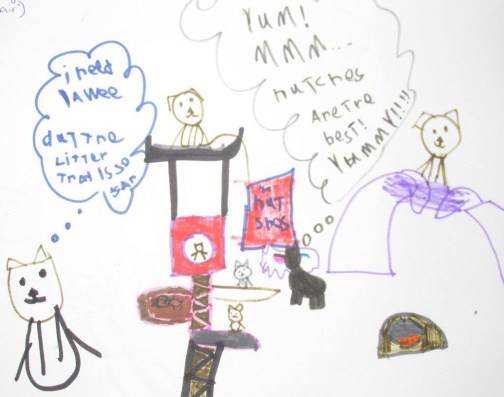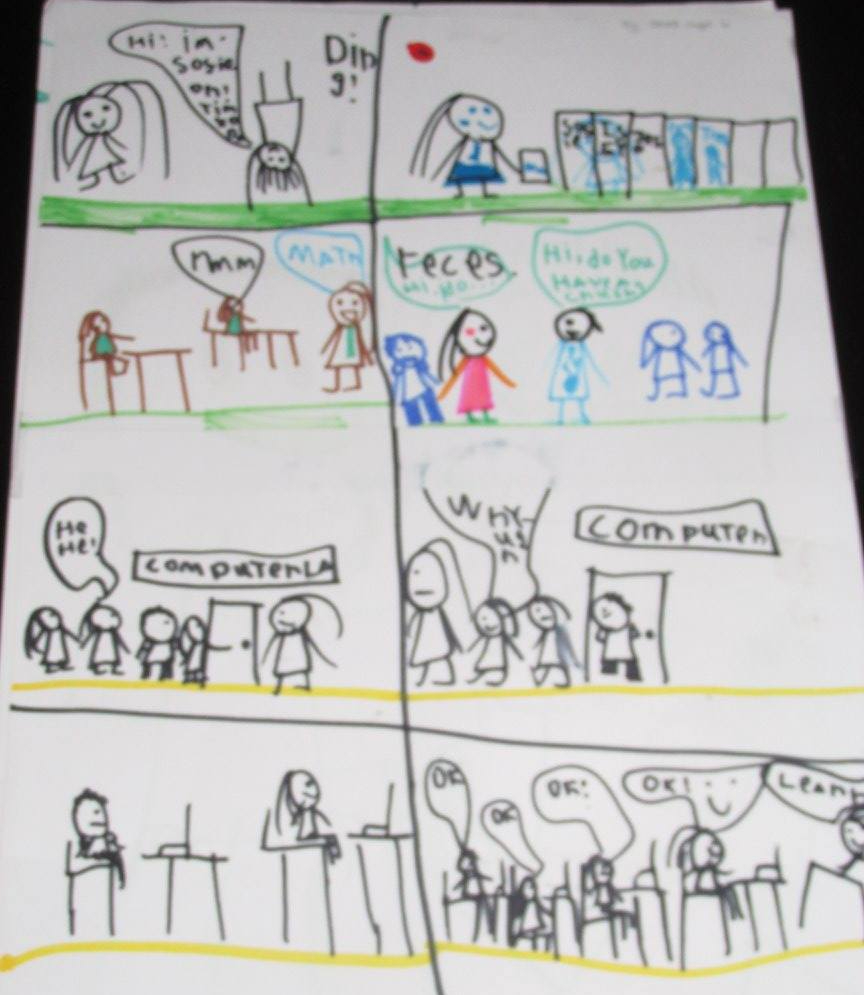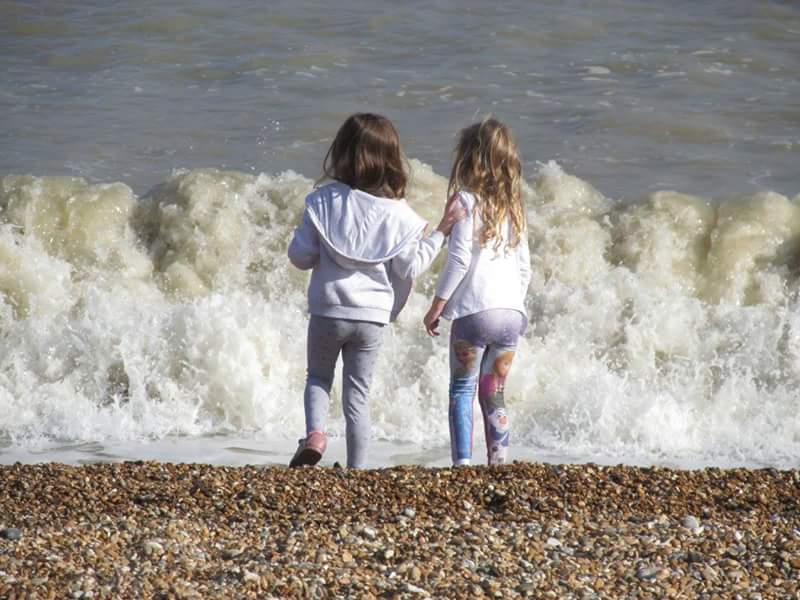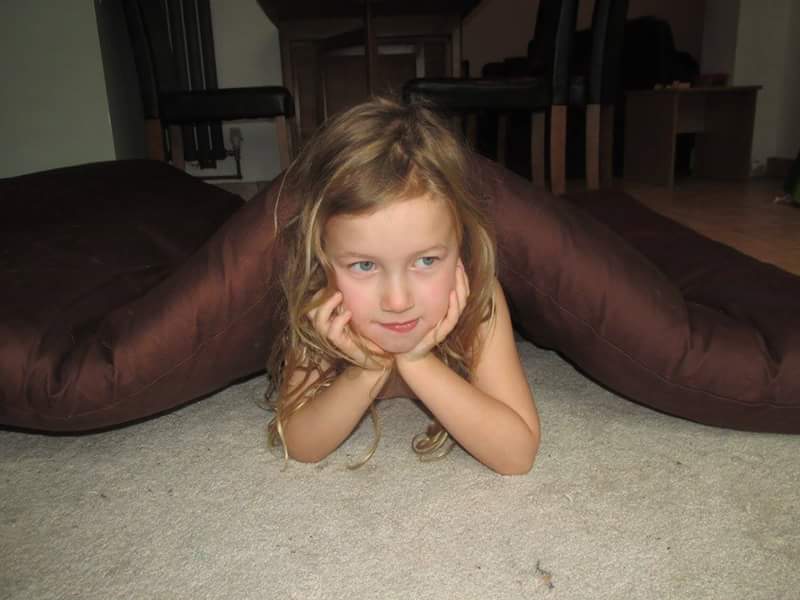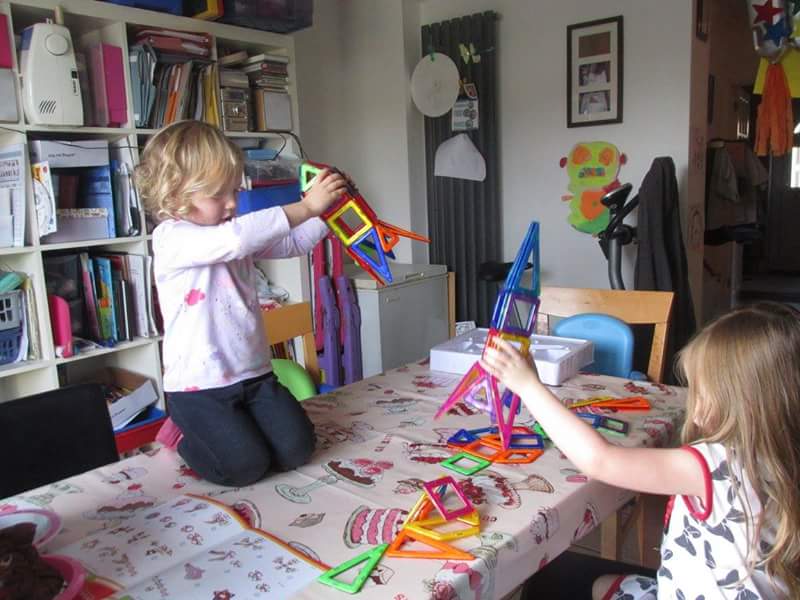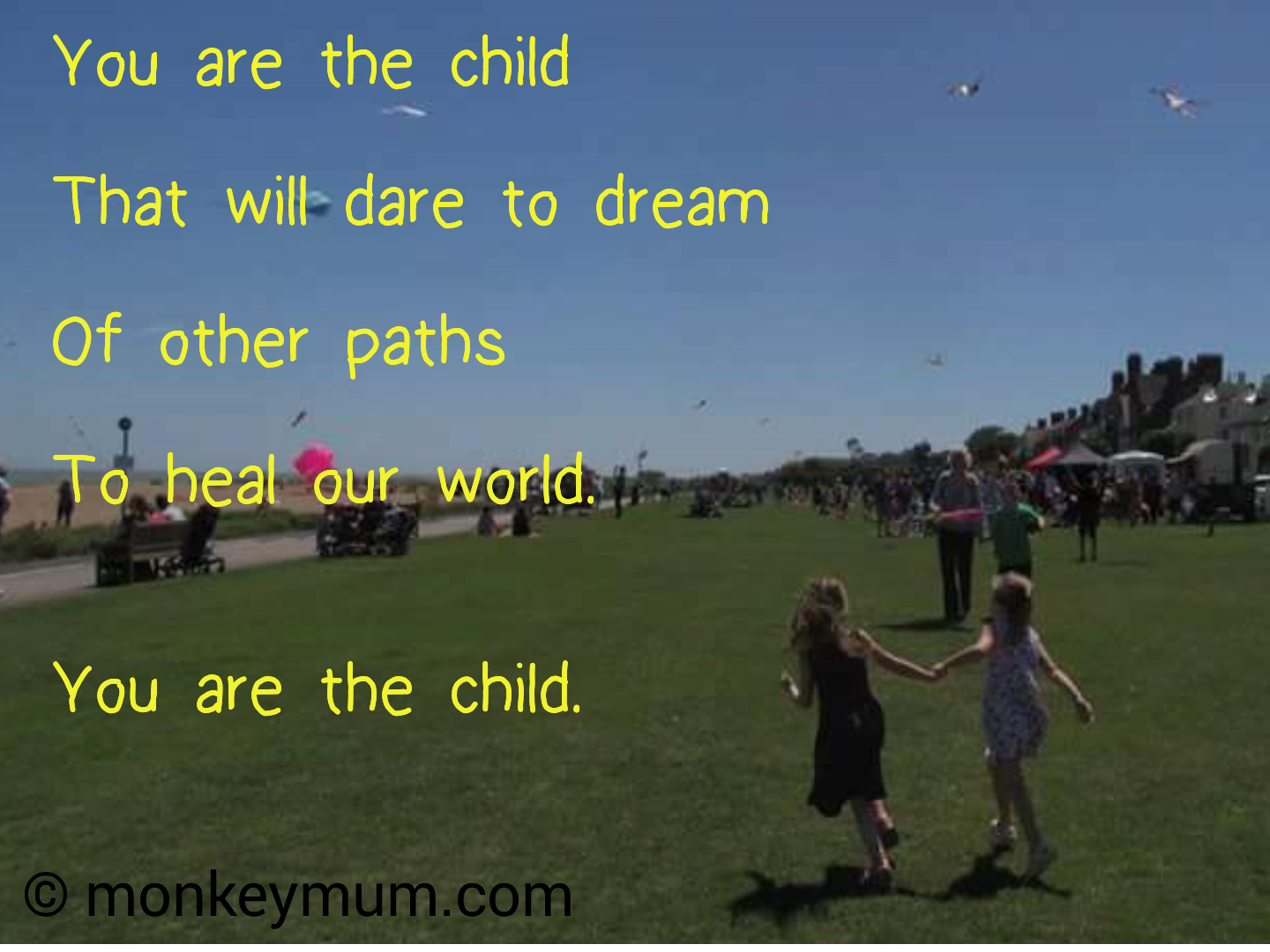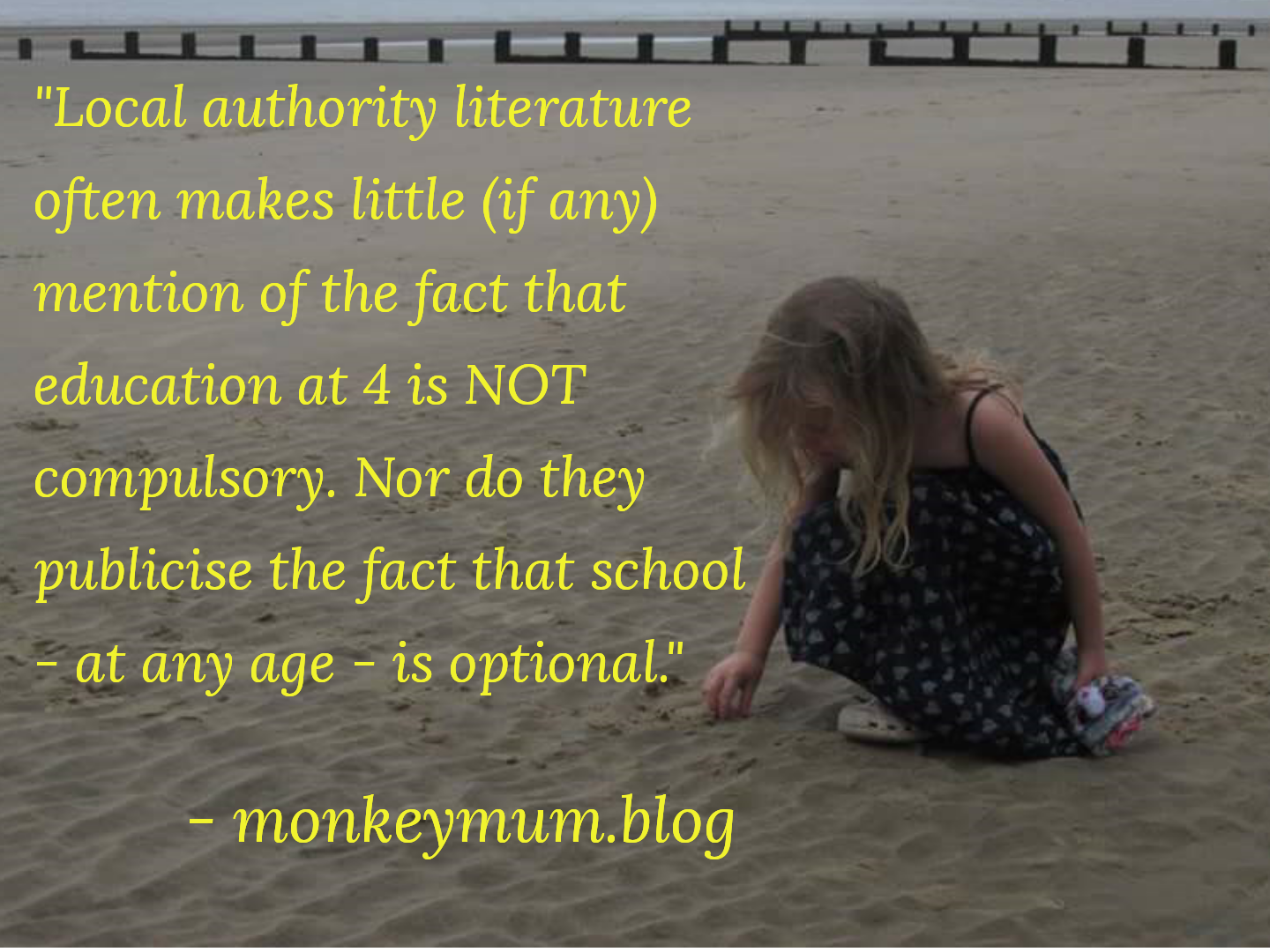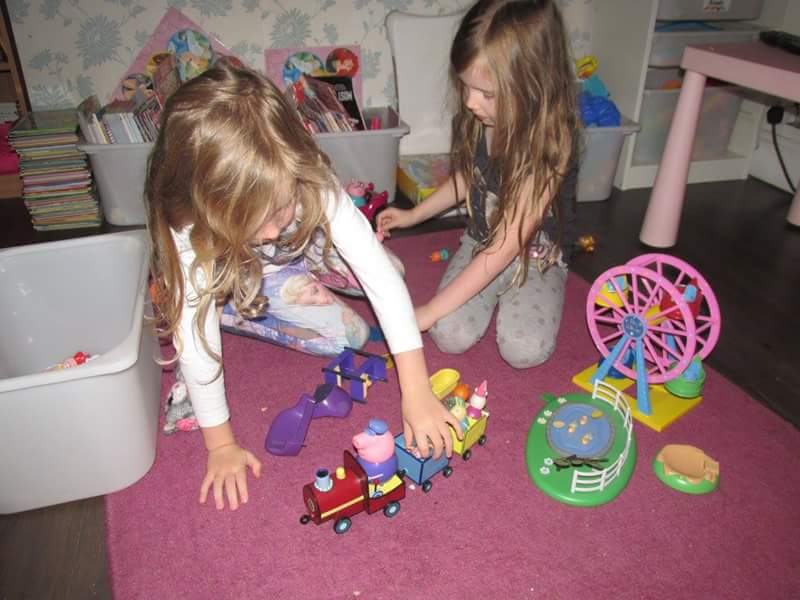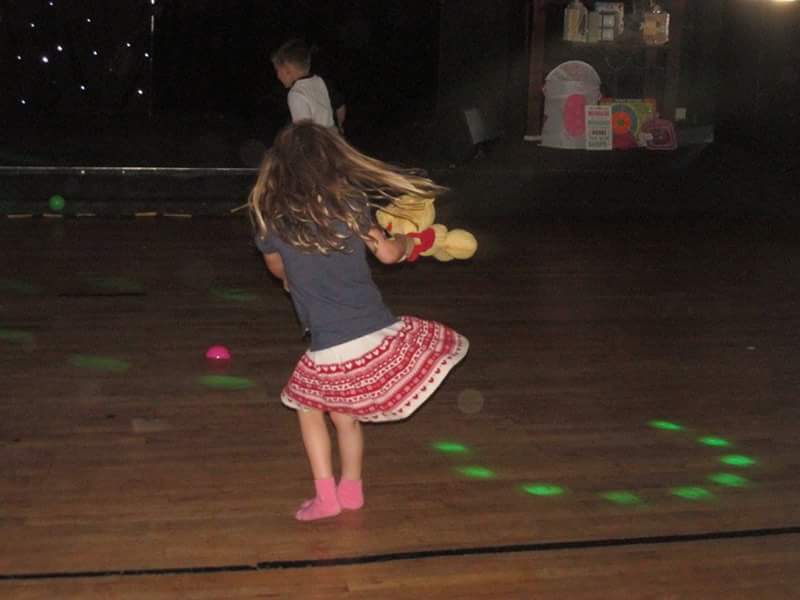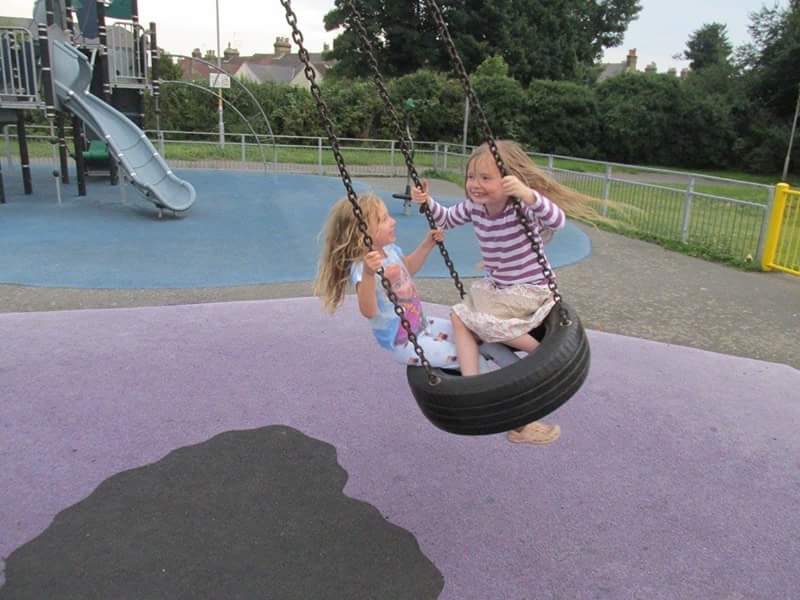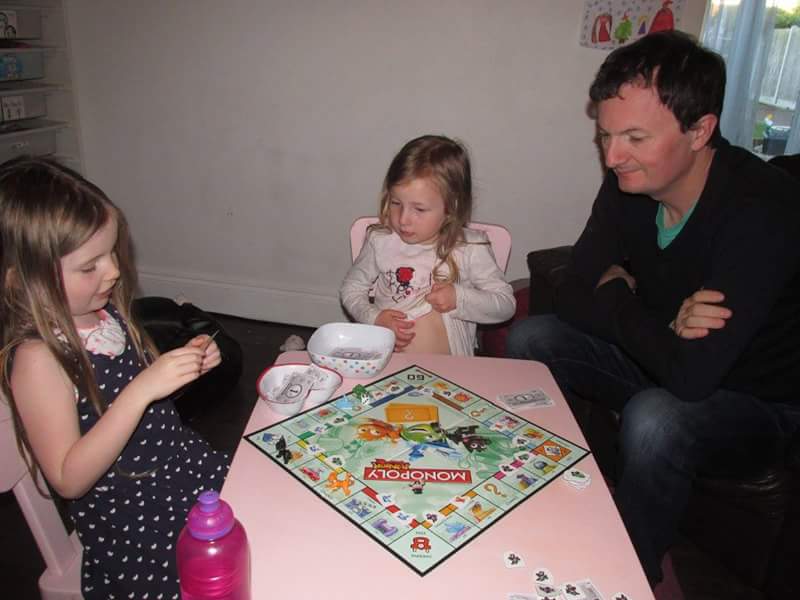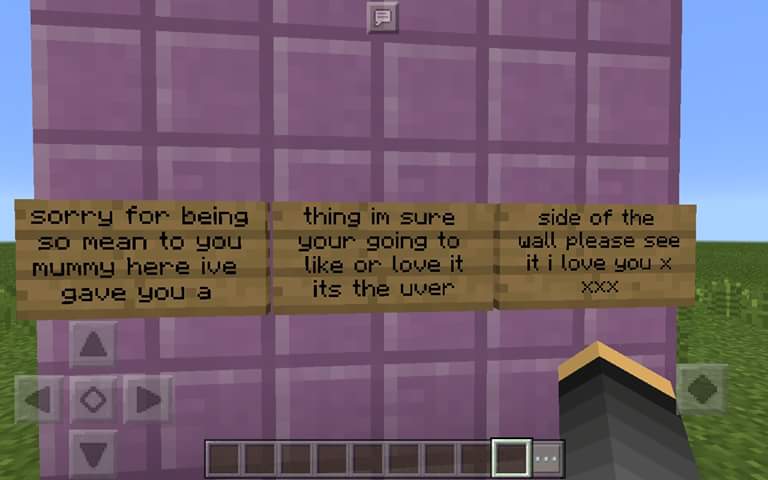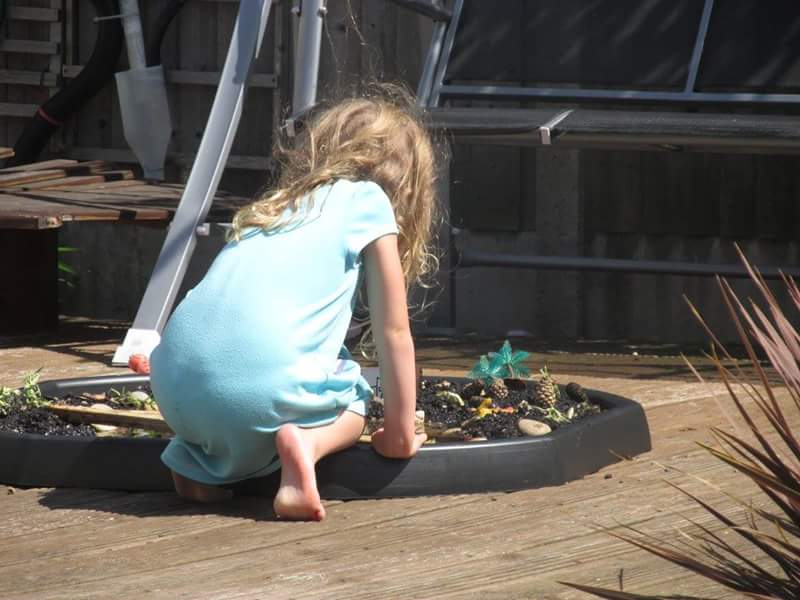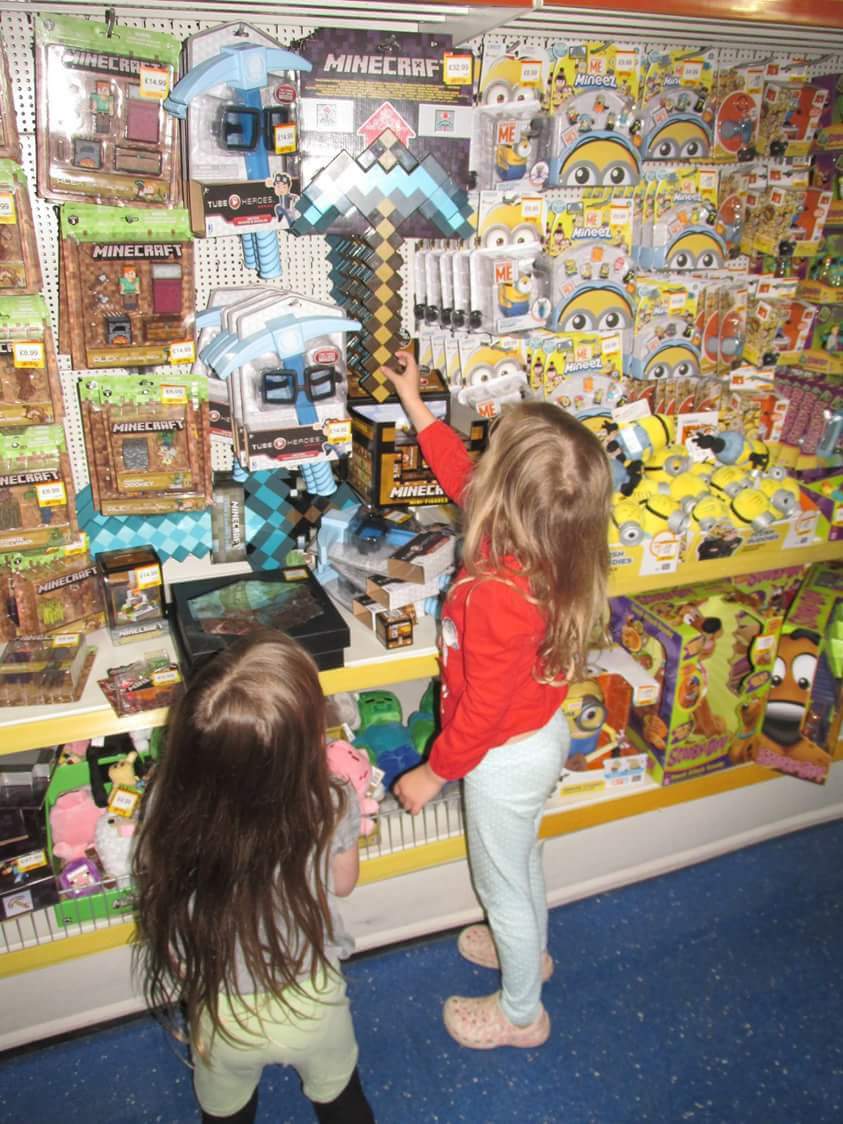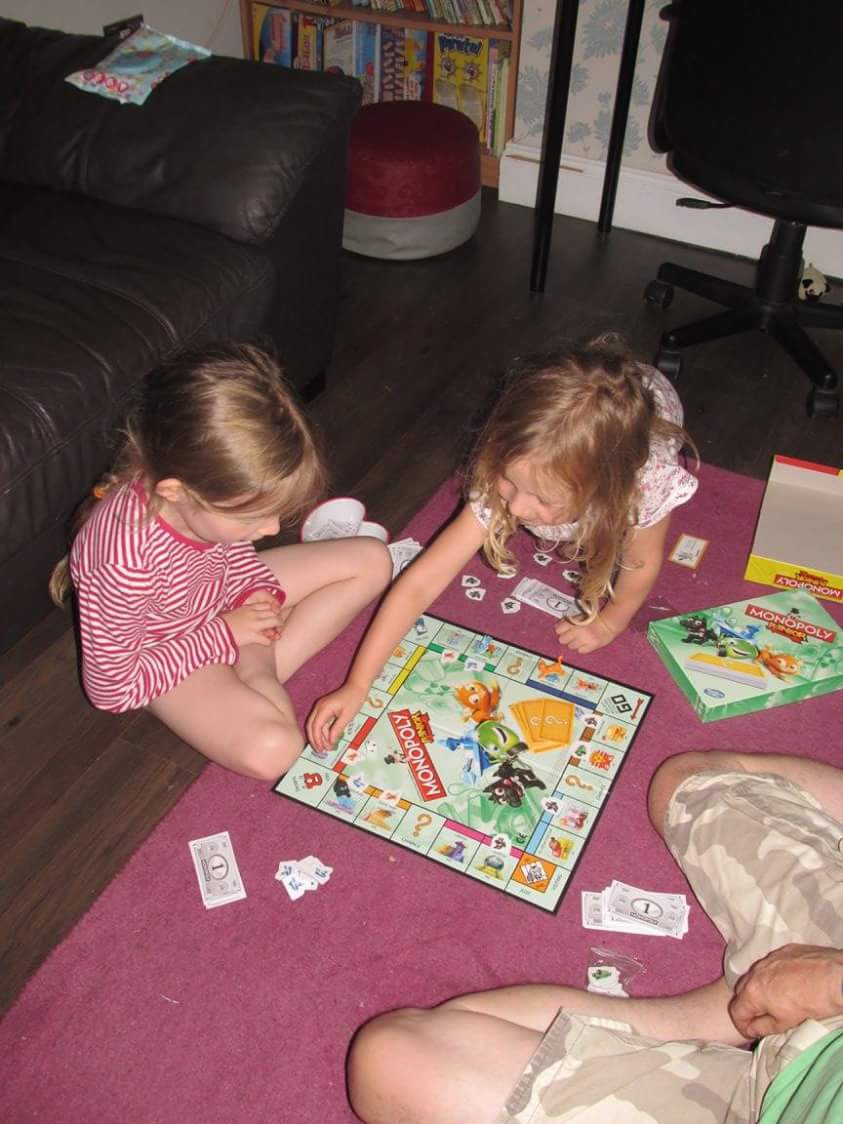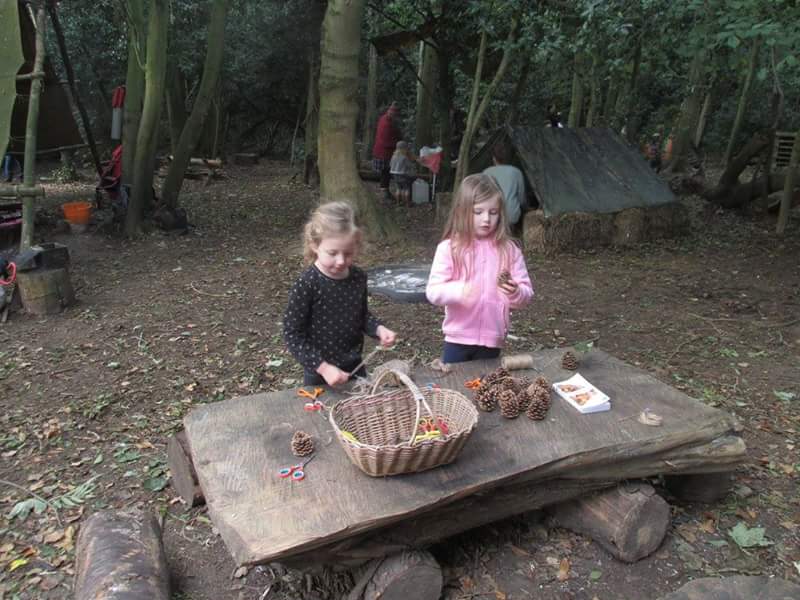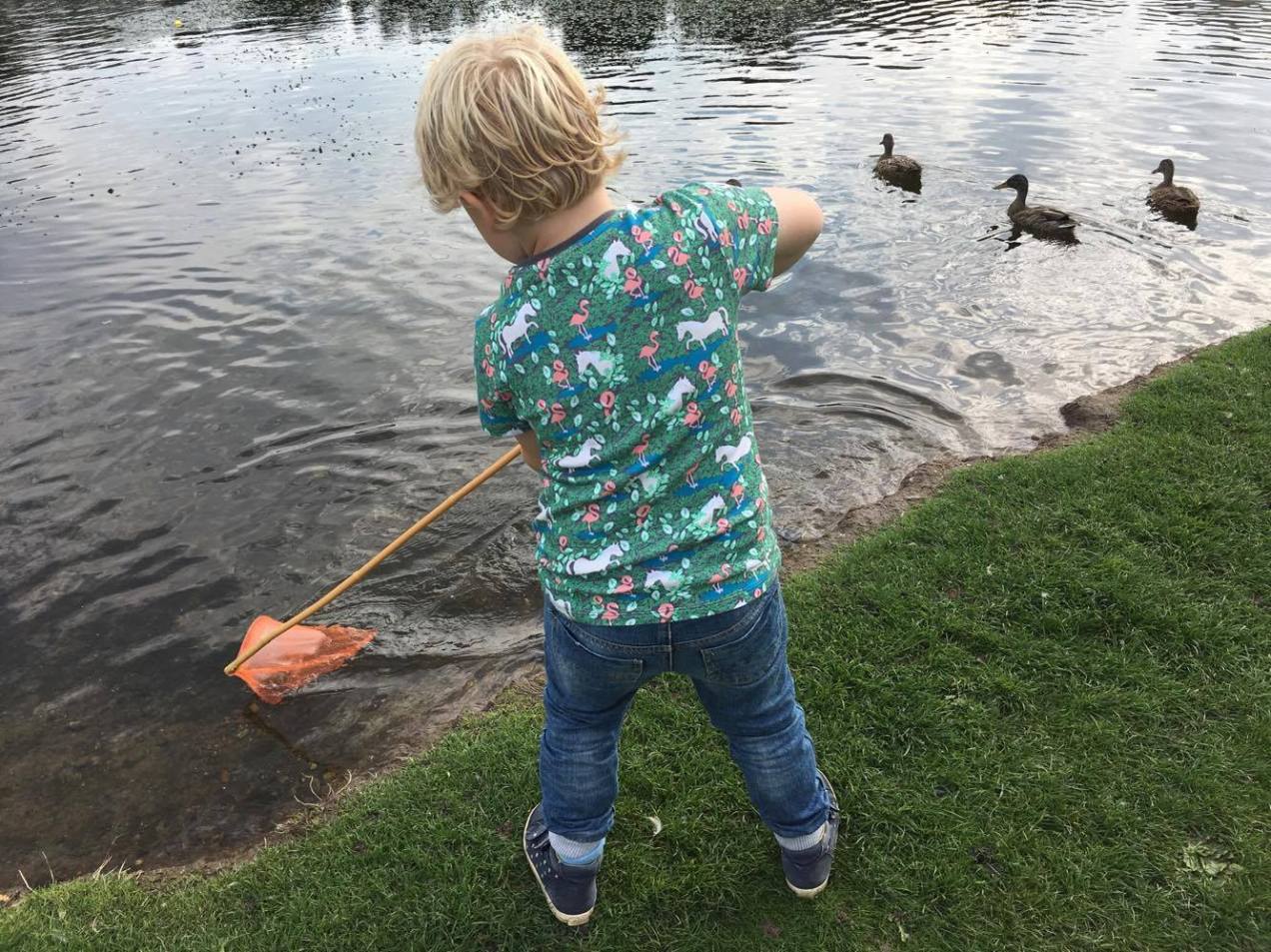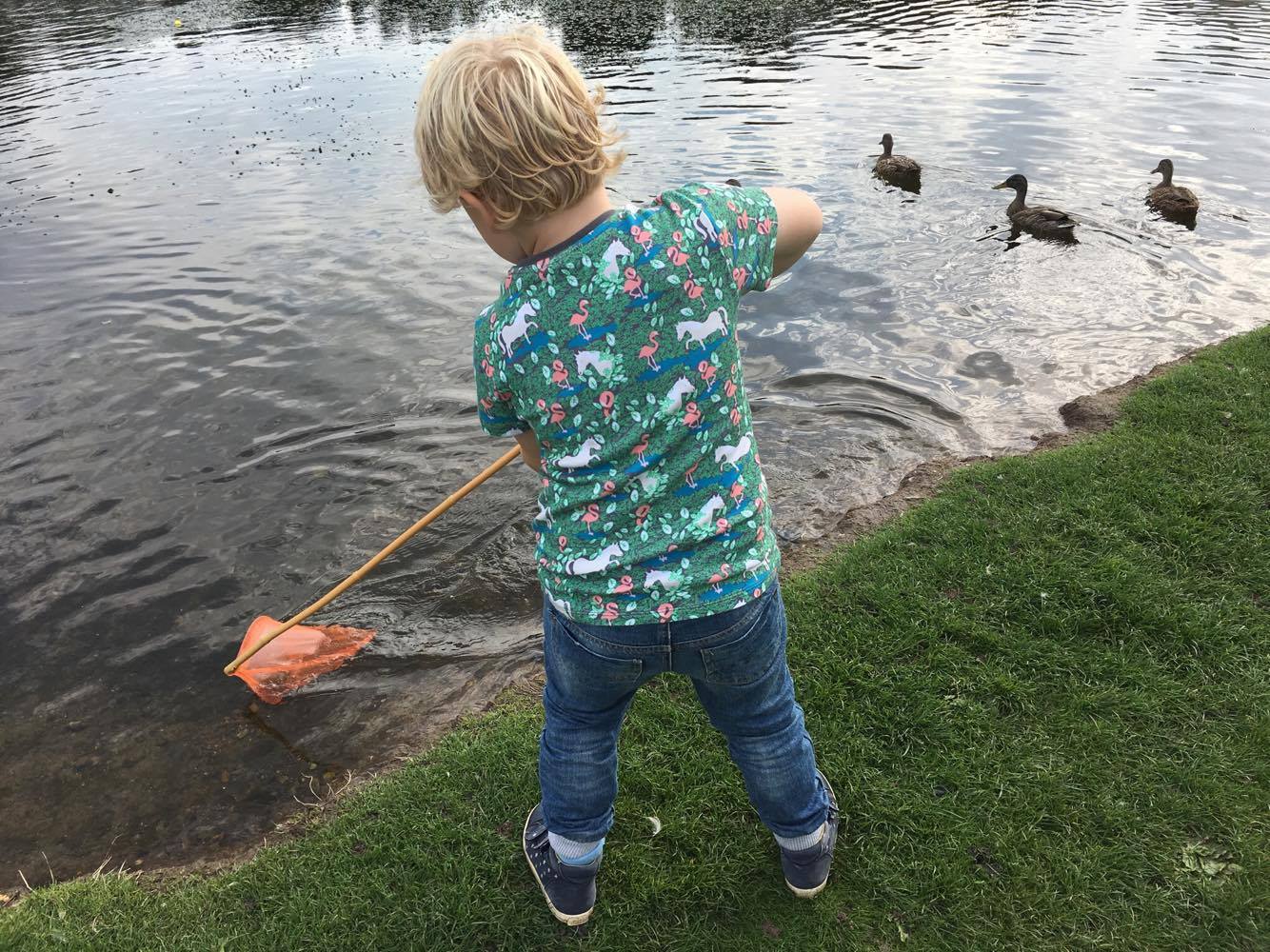
This is Jess. She’s 9, almost 10 now! Where have the years gone?
I’ve written about Jess in lots of my other posts. Right now, she is healthy and happy, but about 4 years ago, something happened to her, which stopped us all in our tracks. It was a rocky ride for all of us for a while, and it all started with a tiny spot.
Please note – this post contains photos and details of Jess’s skin tumour, which some people may find disturbing.
Sometime towards the end of 2016, when she was just 5, Jess showed me a little spot on her arm. A little insect bite, perhaps. It wasn’t bothering her too much, she said, but sometimes it itched.
Here she is, showing me her wobbly tooth, in April 2017, just after she turned 6.

You see that tiny pink dot just below her right shoulder? That’s it. A tiny pin-prick-sized dot on her skin. I told her it looked like an insect bite and to try not to scratch it. It would go away soon.
But it didn’t go away. Most of the time it didn’t bother her either. Occasionally, she complained it itched, and we’d put a bit of sudocreme or calamine on it, still thinking it was a little bite or sting, or perhaps an ingrown hair follicle or something. As it didn’t seem to be bothering her much at all, we all put it to the back of our minds. In hindsight, I wish we hadn’t.
During the summer of 2017, Jess started to complain about it more. It was itching more and began to grow a little bit. The tiny pink dot grew very slowly into more of a bump, a small, firm round bump.
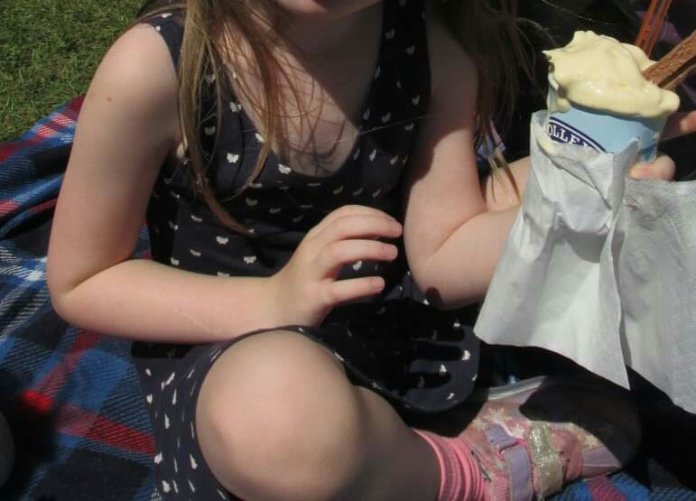
Jess, knowing that we’d advised her to try not to scratch it, almost never touched it. She was really good at resisting the itch. It still wasn’t causing us too much concern, and most of the time Jess said it didn’t itch at all, but as we could see that it was beginning to grow, we went to see the GP.
The GP examined it and said he wasn’t sure what it was, and that he would refer us to a dermatologist to have a look. This was in August 2017.
So then we waited. A couple of weeks later a letter arrived, asking us to book online, so I did. The earliest appointment available at either of the two hospitals we were given as options, was in November. I was cross that it seemed so long to wait, but I booked it anyway. The spot was continuing to grow, but very slowly.

A couple of weeks before our November appointment, a letter arrived, telling us that, due to unforeseen circumstances, the appointment had had to be postponed and a new date would be sent to us as soon as possible. At this point, I began to get concerned. We seemed to have been waiting a long time. And although Jess want concerned or bothered at all, I was very aware that she had on her skin an undiagnosed ‘spot’ that was growing, and I have to admit, I was beginning to worry. That day, I rang the number on the letter, and told them that I was concerned. The man on the phone gave me another number to call – a different local hospital in a different town, that may be able to see us sooner. Calling them, they booked us in, at their earliest available date, 20th December. I explained that I was concerned that that seemed like so long, and the lady told me I should call every Monday, to see if there were any cancelled appointments I could take, to get in earlier.
So then we waited again, and called on Mondays. Thankfully, one Monday, we were given a cancellation slot – an appointment for the following day. It was early December.
I messaged my mum and asked her if she could please come with me, knowing I’d have to take both girls with me, and not knowing what to expect when we were there.
The night before the appointment, Jess ran into a door frame at home and banged her arm. For the first time, the spot bled. It seemed to be bleeding a lot, and Jess, being terrified of bleeding, was beside herself for a while, until it stopped.
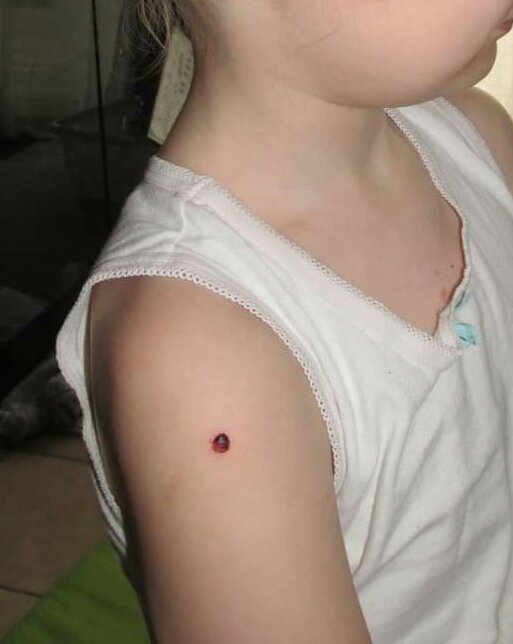
The first diagnosis – December 2017
Next morning, off we went. Mum waited in the waiting room with Amy. Luckily it was a children’s unit, with toys and some colouring things.The dermatologist looked at Jess’s arm and asked us a few questions, then said, “What you have is called a pyogenic granuloma. It’s perfectly harmless, but we will have to take it off.”
She seemed pretty certain in her diagnosis, and explained that it was a little cluster of blood vessels, would bleed when knocked, and might carry on growing until it’s removed. She explained that it would be “scraped” and cauterised, under local anaesthetic. She also checked another spot -a wart- that Jess had on her leg, which she concluded was unrelated, totally harmless, and she could freeze that one off now if we liked.
Knowing how anxious Jess already was, we declined. That spot wasn’t itching or growing, or anything like that, so we decided to leave that one alone for now, rather than leave her with a sore blister right where her clothes would rub.
We left the clinic, relieved that we knew the diagnosis, relieved that it was benign, and relieved that we’d soon be rid of it. We thought.
We waited for a letter to come through with an appointment date. The first letter we received, had a date in May, and my heart sank, thinking we’d be waiting another 5 months. But soon after, another letter arrived, with an appointment in January. Thank goodness! I asked mum to come with us again.
During that time, all through Christmas and New year, we kept plasters over the spot, mainly because it becoming was more and more vulnerable to bleeding, as she pulled winter clothes on and off. Each time it bled, it seemed to grow more, straight after. By early January, it had become about the size of a button, or a 1p penny. It seemed to be especially fragile since it stood out, not flush, on her skin, like a button on a cardigan. It was accidentally knocked often, slept on and bumped as she bounced around.
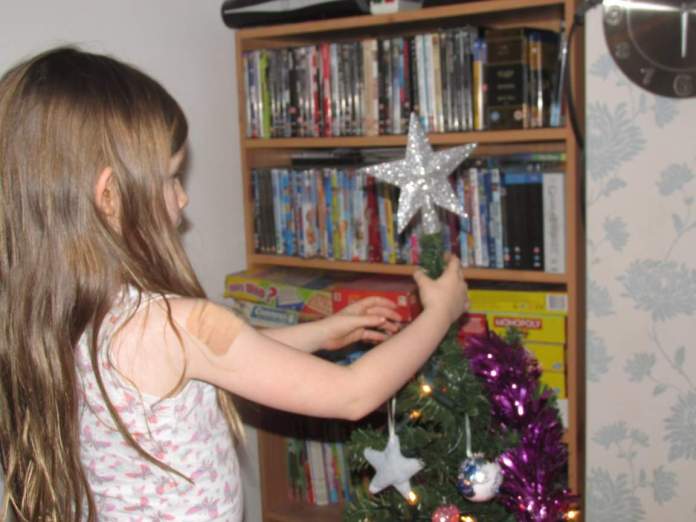
The worst part was dealing with the plasters. Jess, being so terrified of pain, and so sensitive to it, struggled massively each time a plaster had to be removed. It was such a battle every couple of days! She knew it had to come off, but she was terrified of the pain of peeling it back. Some oil helped sometimes to loosen the adhesive. I didn’t know at this time, that you can get little wipes that dissolved plaster adhesive. A nurse gave us some later on in our journey, and I wish we had known about them at the time! Every time seemed like a trauma.
The first procedure – January 2018
Eventually, on the 14th of January 2018, we went to the hospital for the procedure to remove the “spot”. By now it was about as wide as a penny, and stood out about a centimetre from her skin. When it wasn’t bleeding or scabbed, it looked a bit like a flat raspberry. But because it was so fragile and prone to bleeding, most of the time it was mottled with scabs.
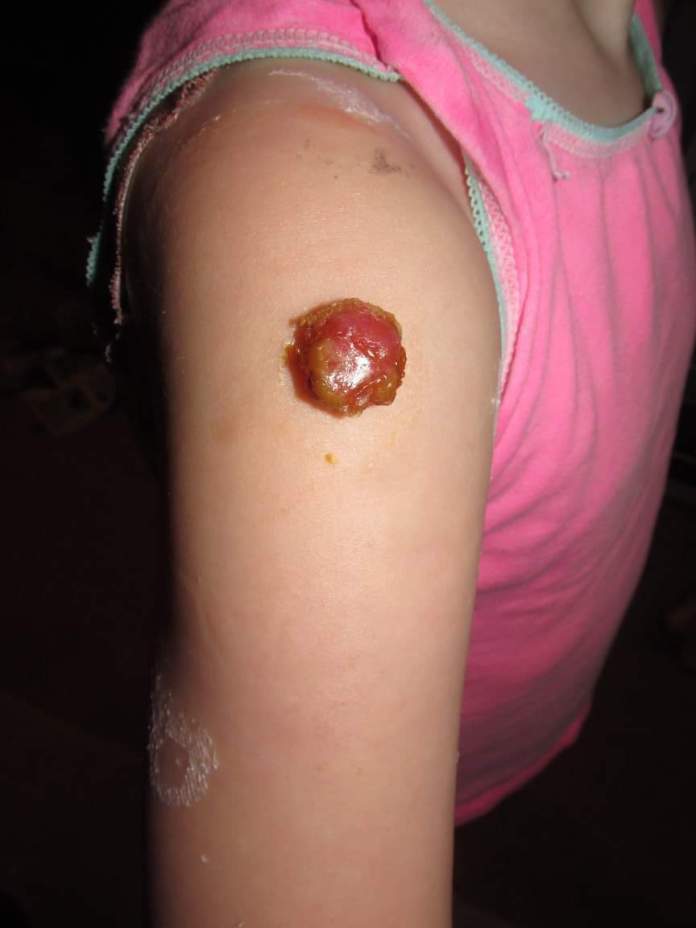
Jess was terrified. There is no other way to describe it. She was terrified. We went to the hospital an hour early, so the nurse could put on Emla cream, then they wrapped cling film around her arm and we waited an hour.
Again, mum stayed in the waiting room with Amy. We’d been told the procedure would be quick and straightforward. When we were called in, we were met by a nurse, a doctor, and one other man, who was perhaps a student or something, I’ve no idea – I don’t remember and I didn’t care. He didn’t do a lot, just tried to convince Jess at one point – spectacularly unsuccessfully – to look at a Where’s Wally book.
Jess sat in the chair and the nurse tried to talk to her, but she was petrified. She could barely speak. I signed the consent form and sat beside Jess and held her hand. The whole time, Jess never took her hands away from her face.
The anaesthetic injection, the one that was apparently supposed to not hurt because she’d had Emla cream on – or so they had convinced her – hurt her like mad. She sobbed. And continued to tell them that she could feel The needle every time they prodded her skin to check. The doctor kept telling her, ” that doesn’t hurt, that can’t hurt…” And I wondered why she kept trying to convince Jess of that, when she was clearly being told otherwise. At the time I had no idea that for some people, local anaesthetics are not very effective. Another thing I wish I had known at the time so I could’ve advocated a bit better for her. Whether her pain was physical or psychological, it was traumatic for her.
Eventually, unable to continue until she knew the area was numb, the nurse sprayed a cold spray on her arm, a special ‘Elsa’ spray, she called it, which I think did help to numb it.
Jess continued to cry as the doctor removed the ‘spot’ and cauterised the wound. When Jess saw the pointed cauteriser, she grew terrified again – it looked like another needle. The ‘spot’ was put into a little plastic pot, a plaster was put over the wound, and we were ushered on our way. I’m not sure how long it had taken. It seemed like time had been standing still.
Jess had gone quiet and I’d done my best to comfort her and tell her how brave she’d been. As we walked back down the corridor to meet Mum and Amy, Jess was suddenly the most cheerful I’d seen her in weeks. A massive weight had been lifted from her. She was excited that she’d soon be able to sleep on that side again, that she’d be able to not have plasters anymore. She told me that after this, she never wanted to see another plaster in her life. She was so relieved it was done. It was over. We both were. Now when I think back to that moment, when we were oblivious of what was still to come, I feel sick.
We left the hospital and life went back to normal. We cared for her wound just as they advised us – cleaning and applying Vaseline daily. It was a little red blister. It seemed to be taking a long time to heal and the Vaseline that we’d been told to keep applying, seemed to be preventing it from drying out and healing. But we stuck with it.
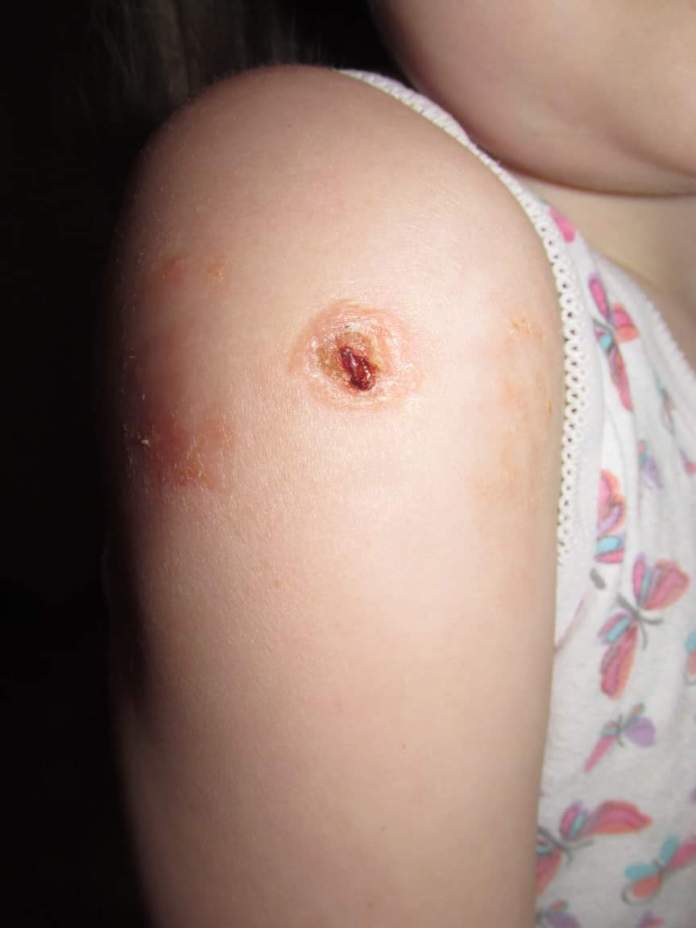
Meanwhile, the spot that they had removed, was sent to the pathology lab for testing. The doctor had told us that it could take weeks to hear back, but if there was anything concerning, we’d most likely hear within a couple of weeks. So no news would be good news. We kept everything crossed for good news, but as no-one had seemed in the least bit worried about any of this, we had no reason to be worried.
The rest of this post is all extracts from my journal over the coming days and weeks.
…
Friday 26th Jan 2018
A fortnight ago, Jess had the procedure to remove her spot. They were pretty sure they knew what it was and that it was benign, but obviously they sent it off to histology anyway, to confirm diagnosis.
The surgeon on the day, said that if we hear nothing it’s good news, because they usually only contact you if there’s an issue.
Today I had a phone call asking us to go in on Monday morning to see a consultant. We were at Amy’s gymnastics, and it was a crowded room, and it was difficult to hear. I have to take Jess to the hospital at 9.30am Monday morning.
I’m terrified.
The whole thing has been so stressful, and going on for over a year, and Jess was so relieved to finally have it removed. Suddenly it was like the weight of the world has been lifted from her, and now I’m absolutely petrified about going on Monday in case they say it’s cancerous.
She’s been so brave. She really suffers with anxiety, and the last half a year or so has really tested her. Consultations, referrals, surgery, and all the time having to dress, clean, and redress this goddamn lesion as it gradually grew. I’m so proud of her, and at the same time I’m petrified for her.
The receptionist I spoke to at 4pm today, when I got the call, said it was too late to speak to the consultant on the phone, and she didn’t know any details, and I could try calling on Monday morning to speak to consultant… But that’s when the appointment is. Jess’s dad said to me today, “don’t worry, if it was anything really bad, they’d be calling us in really urgently…” I said, “it was 4pm Friday, they want to see us Monday morning. That is pretty urgent, I think.”
I’m praying it’s not as bad as I’m imagining. And I can’t sleep worrying.
…
Monday 29th Jan 2018
In the waiting room
A racing heart, a bag of nerves,
A tapping foot, my stomach churns,
Holding you, I feel your fear,
Brave face, deep breath, I hold you near.
I’m trying not to let you see,
the fear and worry that grips me,
relax my shoulders, look at ease,
Let this not be awful, please!
You touch my hand and look at me,
“I’m worried and I’m scared, mummy,”
I stroke your hair, and hold your hand,
“I know, my love. I understand.”
When they called, we weren’t prepared,
I played it down, but I am scared.
“What ifs” are racing through my head,
Filling me with fear and dread.
“What if they say it’s not alright?”
Your face is pale, your eyes are wide.
You watch me as I try to find
An answer that will ease your mind.
“Well then, they’ll tell us what to do,
To make things right,” I say to you.
I kiss your nose, I hug you tight,
I tell you that we’ll be alright.
But deep inside, I’m terrified,
And pray to God, I’ve not just lied,
I close my eyes and hold you near,
I take deep breaths and hide my fear.
…
The consultation
We entered the room and sat down. There were 3 adults already in the room. I didn’t know who any of them were.
The consultant (Dr Rfidah) asked Jess how she was and noticed her missing teeth and made some small talk. Then he said he wanted to just check with me the history, so he asked about how it all started and I explained the tiny spot, not getting better over a year, then the GP appointment, and then referral, and how it gradually grew in between these times. He asked medical background questions, such as what kind of birth she had, if she got sunburnt, if we went abroad on holidays to hot places, if she was on any medication etc. At the mention of sunburn and holidays, I knew it was not good.
Then he asked to look her over, took the plaster off her arm, and checked the lesion. Checked her arms, legs, back, neck, and asked to check the wart on her leg.
Then he asked if Jess could go out of the room, to play with daddy in the waiting room for a bit, so he could talk to me. Unimaginable fear gripped me. Desperately trying to hide it from her, I took her out.
When I sat back down, I was shaking. The doctor said that he’d received the pathology results from the lab, and there were some things in it that were concerning. He said some of the results suggested it could be melanoma. They weren’t certain, but because it was a possibility, it would have to be followed up with a referral to an oncology unit. I think I felt numb.
He added that he thought it was highly unlikely to be that, because it is so rare in children, and in his 20 something years he has never had a case that HAS definitively been diagnosed as melanoma, but that he had had some come to him, like Jess, as suspected, but had, under further investigation, turned out to be some other kind of benign lesion.
But, as the possibility was there, he was recommending that this be treated as a melanoma, with a referral to the Royal Marsden Hospital in London. The cancer hospital.
I asked what happens next, and he said he will call them and send them the report and specimens, and that they will quickly, within the week most likely, come back to me with an appointment for a consultation there. He said they will decide what needs doing, but it will likely be a wide local excision, where they remove a bigger area. I asked if they’d do that straight away and under local or general anaesthetic, as Jess would want to know what to expect when we go. He said they would decide that and talk to me about it, but confirmed that it would not be done in that first appointment, anyway, that they would, after a consultation, schedule it in, so we would go back some days later for the surgery. He asked if I had any other questions.
At some point during that, I cried, and one of the other adults, who I now know is a Clic Sargeant nurse, brought me tissues and came and sat beside me.
Dr Rfidah asked if I’d like him to explain to Jess, without using the words melanoma or cancer, and I said yes please. He said he can also talk to Dad to tell him the same as he told me, but I said if he comes in here like I am, Jess will just get more anxious, and I’d like to relay it all to him instead.
Then he asked if I would go and fetch Jess, and she happily came back in. He made some small talk about school, and home schooling, and then said that he’d just been talking to me about her spot, and that it perhaps wasn’t healing quite perfectly, and that he’d like to get another doctor to have o look, so was going to refer us to a hospital in London and they would decide if they need to do some more work on it. I checked with Jess that she understood what the doctor had said, about me taking her to London, (as the Dr had quite a strong accent), and she nodded. She actually didn’t seem too scared, she just nodded and smiled.
Then he turned back to me and said again, that the Marsden would contact me very soon, and in the meantime the Clic Sargent nurse was our point of contact if we had any worries or questions, and she gave me her card and reassured me that she was always available. She asked if I’d like her to ring me in a couple of days to check we are all ok, and I said, “Um, yeah, that would be good, thank you”. Then I thanked all of them (there was one other lady in there, perhaps a student), and came out.
Daddy was playing with Amy in the waiting room. He asked me what they said and, trying not to cry, I told him they were referring us to London because they aren’t sure about it. Not wanting to say too much in front of Jess, I mouthed the word “melanoma” and saw his face drop. “Possibly,” I said. “They’re not sure yet.” We drove home.
…
At the end of this long, emotional day
I lie here, listening to you breathe. I imagine the dream you must be having. This morning you grumpily told me I’d woken you from a dream about being in Barbie Land, and all you wanted to do was sleep and stay in the dream.
I wish I could have let you stay in that dream.
You shift and wriggle a little in your bed. You whimper. An hour ago, you woke up crying, because your throat was sore, and you couldn’t make it go away, and how could you fall asleep with a throat that sore?
This time you whimper and then fall quiet again, with just your steady breathing marking the passing of the seconds… minutes… hours.
I’ve not slept. A few times I’ve closed my eyes, and tried to empty my mind enough to drop off. But I can’t. I feel sick.
So many thoughts are in my head. So many emotions racing through my body. Too much adrenaline, cortisol, stress. Too much worry.
I feel weighted down by my worry. And I feel the burden of the extra worry that I am carrying, in order to stop it from falling onto you. I picture it cascading down, like the waterfall at the pool, that you sit under, and you like the feel of it in your back. But this cascade of worry must not find it’s way to you. It would break you even more than it is breaking me. Your fragile spirit would be torn apart, your heart and head would rage and despair. So I am determined to hold it for you. I’ll take it, I’ll pair it with mine and the two will become one. I feel its weight as I lie here in the small hours, unable to sleep.
Your deep breathing goes quiet. Calm. I wonder again about your dreams. I wonder which world you are in, tonight. I hope it’s a happy one.
And I wish I could join you there.
…
Tuesday 30th Jan 2018
Dear Jess,
Today has been a rollercoaster.
You woke up and your throat was so sore you couldn’t speak or swallow, and suddenly I felt like life will never be the same again. A sore throat is no longer just a sore throat… in my imagination at least.
In my highly anxious, paranoid mind, a sore throat threw up a load of morbid questions about weakened immunity, swollen glands, infected lymph nodes, metastasised melanocytes… And just like that, within minutes of waking, my mind is racing. What if you are ill and won’t fight it? What if your glands and lymph nodes swell up? What if they want to see you today, or tomorrow, and think you’re ill because you have cancer, when really you just have a cold, the same cold Amy has just had a day ago? What if they tell me you need urgent investigations to assess how far it has spread? What if it really has spread, and this is some kind of response to a widespread metastases?
I feel like life will never be the same again, because I know that I might never look at a sore throat, or a cold, or a fever in the same way again. From this moment, I will also see them as a threat.
You know those few seconds, when you first wake up and you’re brain is still sleepy and life is good. Those peaceful few seconds before you remember. Before reality hits you again. And then that sinking, sickening feeling, in the pit of your stomach, when it comes back to you.
Today, Daddy described it as a ‘tunneling’ feeling. And I knew what he meant. You lie on the bed peacefully waking up, and suddenly the world closes in, and you are pulled down the tunnel, leaving your stomach behind.
So this morning started badly, with the tunneling, and the intrusive thoughts about your sore throat. You wouldn’t eat, or drink. You wouldn’t play on your computer or your iPad. You said you wanted to sleep but couldn’t sleep. I have to admit, I thought about calling the numbers I’ve been given, telling them I was worried about you. For some reason I didn’t. I guess I wanted to trust in my instincts, which were telling me, deep down, that this wasn’t it.
For lunch, you ate 3 bowls of strawberries, drank a fruit shoot, and perked up. You played on your computer for a bit. You got up to the toilet and wandered around between the rooms.
As you sat in the bath this afternoon, I told you that I think you will need an operation to get the rest of the spot out of your arm. You cried. You’re fed up of doctors, and spots, and appointments and hospitals. And each step just seems to get worse. You think it’s all over, and then another hurdle appears.
And I saw this, and I heard this, as you told me that you feel like you’re unlucky and you asked me why no-one else has to do all this. And although I tried to tell you that some other children do, I know it means nothing. This isn’t about others; it’s about you. And what you’re really saying is, why do I have to do all this?
And I understand your frustration, Jess. You look after yourself so well. You are the one who avoids sweets, finishes your dinner, brushes your teeth, makes all the healthy choices. yet here you are – the one who has to see all the different doctors and go to all the different hospitals, and now face this scary, unknown, operation, that none of us were expecting. How is that fair?
We talked about what might need to be done – how they might need to do a different kind of operation to get the last bits out. An operation where they put you to sleep to make it easier for you. And you asked me why we can’t just heal it ourselves.
Of course, there’s no way I can tell you the full danger of leaving even the tiniest part of this thing in you. It would terrify you. So I’m desperately trying to convince you it’s necessary, and it’s a good idea, without worrying you. I feel like I’m on a tight-rope.
You asked me about how they would send you to sleep, and I saw your panic beginning to rise. You asked me about dreaming. What if you dream? What if you don’t dream? I don’t know how to answer. I don’t know if you dream under anaesthetic. But you needed to know, and it’s important, so I made a mental note to Google it.
Then you asked me about waking up. How do you wake up? What if you never wake up? Will you be asleep, not dreaming or dreaming, for ever? And why can’t I tell you? And why am I lying to you?!
But I wasn’t lying to – I just don’t have all the answers you are looking for. I told you everything I know about anaesthetic (which isn’t much). In fact, the only things I’m holding back, are the fact that this could potentially be life-threatening, the fact that this operation is a certainty and a necessity, and the fact that I’m terrified. I’m determined not to pile this all on you in an overwhelming way. Softly, softly.
Last night I watched a YouTube video for medical professionals, advising them how to administer bad news to patients. Softly, gently, small chunks, with time to process. And it stuck in my head. I’ve promised you I’ll be honest (and also that I won’t consent to anything that I don’t think is necessary), and I will keep that promise, but there’s no way I can give you that all at once. Small chunks… time to process.
By this evening you were playing tickling games and rough-housing with Amy. The difference was striking. Suddenly, I was saying to Daddy, “There’s nothing wrong with that girl. Look at her!”
When I said I wanted to walk round to the shop to buy more fruit, you jumped up to come with me. You put aside your sore throat and illness and happily came along. And suddenly I was optimistic again. Someone with so much energy and so many giggles, couldn’t be ill with a melanoma, surely?
Later you went back to your online games, right up until bedtime, when you went off to sleep, so much more peacefully than last night.
This evening I said to Daddy, “You know, even if this all turns out fine, and is all over and done with, and cleared, it will change her forever. She’ll always have to be monitored. She’ll always have to cover up in the sun and not tan. She’ll always have this mark against her.”
…
Wednesday 31st Jan 2018 (early hours)
As I came up to bed, I lingered a little longer at Jess’s bed, and put my face down to hers and breathed in her delicious scent. Strawberry soap and sleep. I kissed her head, holding my kiss on her for a few seconds, appreciating the moment with this little person who, 7 years ago, had changed my world beyond all recognition.
I remember when she was just weeks old, a moment, standing in her bedroom in our old house, holding her to my chest, her face nestled into my neck, her head in the palm of my hand. I remember the weight of her in my arms. I remember, not just that I was holding her, but her precise weight – the feel of her in my arms, on my chest, close to my heart. And how the weight of her felt so perfect, as if it was a part of me. And I was rocking, gently, as she fell asleep on me. And I was thinking about how strong that love was. That bond. And the one thing that I remember thinking right there, right then, was that if I ever lost her, if she died right now, I would make myself die too, to be with her. The thought was as clear as day. I would make myself die, to be with her. And in my head (and of course this was before I had Amy) that was the most logical, most reasonable of all thoughts. If she were to die, I would not think twice about going with her.
…
Wednesday 31st Jan 2018 (7pm)
We all slept late and woke up at 9.40am. Everyone needed the sleep after a stressful few days. Jess immediately said her sore throat has gone, though she is still sniffly and snotty.
Today I got a phone call from the Royal Marsden Hospital, asking us to go in, to see the doctor on Monday. They haven’t received the pathology specimens yet, but they want to see us anyway. They might take some blood tests, and they’ll do a physical examination etc.
Just as we sat down to eat dinner, Jess started to cry and said, “Mummy, I’m scared about having an operation.” So I pulled her to me and cuddled her, and listened to her worries. I tried to answer her questions, but some of it I couldn’t because I didn’t know the answers. Like, what’s the most common operation that children have? What’s the rarest? Which other children do I know who’ve had an operation? (None that I can think of.) I reminded her that Monday won’t be an operation, just a meeting to talk and get to know them, which helped a bit.
She’s still scared. I’ve found a couple of child-friendly YouTube videos explaining general anaesthetic and surgery.
But she still keeps asking why we need to do this, why can’t we just look after it ourselves. I’ve told her they need to take out the last bits, but it’s hard for her to grasp the necessity of it, when we are intentionally protecting her from the full weight of the issue.
Ugh.
…
Thursday 1st Feb 2018
Time is standing still. The days are dragging. They said it will all happen fast, but it doesn’t feel that way.
Today Jess still has a cold. She’s not bad, but it’s just enough to make me edgy. I find myself looking at her sideways when she is busy doing something, and wondering if she is sick or well. Wondering if there is something sinister hiding in her body.
It makes my stomach turn over.
The sun was out today, so we went to the park. It was still cold, but Jess and Amy both had fun. I stood for a long time, taking videos on my camera, capturing the joy, the oblivion. I got lots of really lovely video clips and photos, aware in the back of my mind that if things take a turn for the worse… well, it doesn’t bear thinking about. Just determined to capture as much as I could.
She’s so beautiful. She has an innocent beauty. She is not a warrior. She is fragile and sensitive. She always has been.
…
Friday 2nd Feb 2018
I haven’t told Jess yet, that she might have to miss her gymnastics class on Monday, as we are going to the hospital. The appointment is at 12. Gymnastics is at 4. it’s a 2 hour drive (at least) and I think it’s unlikely we will be back in time. She will think it’s massively unfair. she’ll question, again, why we need to go. And why we can’t go another day. And why we can’t just look after this thing ourselves. And I hate that I can’t be truthful and tell her the urgency, but how can you tell that to a child?
I am finding myself wondering if this has always been predestined. I feel like deep down I’ve always known this would happen. That everything that’s happened in the past has been working towards this. It sounds strange and feels weird, but it’s the only way I can explain it. Is this why I’ve always felt like I need to protect her a bit more? Why I can’t imagine her as a grown up? Why she’s always seemed like an old soul, or like she’s out of sync with the world? And then I feel terrible because what if just thinking these things causes them to happen? My feelings are all over the place.
And Jess’s head is all over the place, too. She can’t sleep; she’s tired; she’s grumpy; she has mood swings; she’s anxious; she’s terrified. And although in reality, I know she is usually like this, and it’s probably worse because she’s full of cold, in my paranoia, I’m questioning whether her brain is malfunctioning and whether her emotions are affected by something more than just a bug. I know it’s stupid, but it’s a feeling that’s impossible to shake.
…
Friday 2nd Feb 2018
Waiting
I’m waiting for my world to fall apart.
I feel like there’s a knife stuck in my heart.
I’m waiting for the hell on earth to start.
I’m waiting for my world to fall apart.
I’m reading more than I’ve ever done before.
Theories, studies, remedies and more.
I’m reading till my eyes are red and raw,
To help me cope with all we have in store.
I’m feeling sick with every waking thought.
I see you and I feel my breath get caught.
I feel the knife twisting in my heart.
I’m waiting for my world to fall apart.
…
Saturday 3rd Feb 2018
I’m tired. I’m grumpy.
The kids are both good. Jess is much better than she was a few days ago, with her cold, but she’s stressed and anxious and I have to keep reassuring her about Monday. Today we talked about blood tests – why she’ll need them and what to expect. She’s scared of another syringe.
I’ve been noticing numbers. 22:22 on the clock. £11.11 at the checkout. Lots of different examples, so I googled it and have been learning about synchronicity. Oh boy! Now that made sense. My interpretation of what I read, was that it’s a way of connecting with your “spirit team” and a signal that you can reach out to them for answers or support. Well, since Dad died, and I had a couple of moments where I just knew that his spirit was with me, I am totally on board with believing this. In this – probably the most challenging time of my life so far – I can absolutely believe he (or they, or whoever) would send some signs to let me know they are there.
So with that in mind, I found a card-reading website. The only question I asked was, “Should I be worried about Monday?”
The cards came up with (I’m paraphrasing here):
- 1) you are wise
- 2) use the internet
- 3) you are not ready yet
So I guess I have some more reading to do before Monday.
…
Sunday 4th Feb 2018
Jess has cried a bit today about all the things she is worried about tomorrow:
- having to go in the car for an hour and a half
- getting stuck in traffic
- parking the car
- not remembering where we parked
- having an injection
- them finding she has the wrong type of blood (?)
- possibly missing gymnastics.
She’s gone to sleep now, but we had tears at bedtime.
I have reassured myself by reading more. I read over the pathology report again, and it didn’t sound so bad this time. I read about melanoma treatment, looked up wide local excision and sentinel lymph node biopsy. I steered clear of anything that looked scary. But now that I have a much better idea of those procedures, I do feel reassured. I definitely feel more ready to go in there tomorrow and hear what they say. I don’t think it can feel any worse than this time last week. Whatever the outcome now, I won’t feel in shock.
This evening, as I laid at the end of Amy’s bed, as I do every night while they fall asleep, I thought about it, and said a silent thank you to my spirit team for guiding me yesterday and today. Without thinking I looked at the clock, and it was 22:22.
It’s everywhere. 2 days ago it was in Tesco, when the shopping that Jess helped me scan through the till, came to £11:11.
It was on the milometer in the car …1212
I feel reassured. I’m receiving their messages and it’s really comforting 💜
…
Monday 5th Feb 2018
We drove up to London, to the Royal Marsden Hospital. All 4 of us went. Jess worried and worried about the journey. I suggested using the dvd player, which helped. And we left early to calm her worry about traffic.
We arrived. We’d never been here before. We parked and found our way to the children’s department – The Oaks Centre – where the reception nurse led us around to the waiting area. I had to fill in the registration forms and Jess went off to be measured, weighed, bp-checked and nose-swabbed. Then we waited to be called in.
We were eventually called by Dr Julia, who was friendly and kind, and understandable and clear. She asked if Dad and Amy, who had stayed in the waiting room, would come in too. So nervously, I went and told them to come through. Dr Julia said it’s normal for the whole family to come in together here. She asked about the history of the spot, and a few other questions. She checked the family’s medical history. She looked at what remained of Jess’s spot and agreed that it wasn’t drying out enough to heal and we should stop applying Vaseline and she would get a nurse to swab and redress it.
She seemed surprised that Jess had had it removed under local rather than general anaesthetic, and was surprised at the size of it.
She checked Jess over thoroughly, including her back, neck, legs, arms, and also felt her glands in her neck, armpits and groin, which she said felt fine. Jess was quiet and anxious and wasn’t keen on the questions or the physical examination, but she was a star the whole time.
Dr Julia explained that although they now have the pathology samples they’ve been waiting for, they haven’t been able to finish studying them yet, so we are still unclear exactly what we are dealing with. It could be melanoma, or it could be an atypical spitzoid tumor, and because this is so very rare, it’s hard to say what the course of action would be. But because pathology has said the base has not been removed, it will definitely involve an excision operation, probably at the hospital at St George’s. Likely she’ll also need some scans, eg ultrasound of lymph nodes, CT and MRI to check further.
She has set up another appointment for a fortnight today, to go back to her, to discuss next steps, once the pathology specimens have been looked over again. By then they may be able to give more info about what happens next.
Jess was an angel. She was upset when we had to wait longer to have her arm redressed, as we told her we didn’t think we’d be back in time for gymnastics. She was desperate for Daddy to watch her do gymnastics today, as he’s usually always at work. In the end, after we left, I floored it down the motorway and got her there on time. It made her day, and I finally felt like a good mummy again.
Amy was an angel too. She just seems to be getting used to accompanying Jess to various hospitals now. She likes the play areas I think, but after a couple of hours of waiting around today, she’d definitely had enough.
So now we wait again, for a phone call confirming that they’ve finished with the biopsy review and hopeful indicating what scans etc might be needed when we next go in a fortnight. I made sure to ask to be told in advance as I know how anxious Jess will be if she doesn’t know.
At the moment, despite talk of melanomas and tumours and further treatments today, Jess is still only aware of things as far ahead as the operation to get the base of it out. We’ve not talked to her about scans and things, but I guess that will have to come next. That’s going to be tough.
I will say this, though: being in the hospital today and seeing such tiny children hooked up to chemo drips, some with no hair, and walking around with tubes in their noses, it certainly brought perspective. Kids go through this. Kids come out of this. And the kids today were just taking it in their stride. I know we only saw the best of it, the day care and the outpatients, not the inpatients and not the ones that were terribly ill, but still, it was reassuring. And I could have nothing but praise for the staff, who were making everyone so comfortable and welcome.
…
Tuesday 13th Feb 2018
Had a phonecall today from St Johns Hospital (which is in Tooting) asking us to go in on this Friday at 9.30, to meet with a Professor Powell. Well that’s going to be a nightmare getting there for that time in the morning! It’s a 2 and a half hour drive, in London rush hour. Darryl says he can’t take another day off either, so looks like it will be only me on my own, and the two girls. Eek!
…
Wednesday 14th Feb 2018
Suzie, the Clic Sargent nurse, rang today (for the first time, though she said she had called a couple of times with no answer… hmmm) and asked how we are all doing. I had a chat about our trips to London (the one we’ve done and the one that’s coming) and also how Jess is frustrated that she feels like she’s the one that’s hard-done-by. Some days, especially when she’s tired, she asks, “Why me? Why doesn’t everyone else have to do all this?” I’ve tried to explain that many children have all kinds of health problems, we just don’t hear about them, but to be honest, I do get her point. It just makes no sense. She’s the most cautious, careful, and healthy-seeming one out of all of us. It just doesn’t seem fair.
…
Friday 16th Feb 2018
So today we (Jessica, Amy and I) were up at 5am. Well, technically I was, and Jessica begged, “Please just 5 more minutes?” so I left her until 5.15 before I went and shook her awake again. We managed to leave the house before 6am, by some miracle. No -one had eaten, do I chucked some cereal bars and fruit in my bag, and off we went.
The roads were mostly clear until we got inside the London orbital. By that time, the traffic was getting heavier, just as we were driving through all the south London boroughs, but still not too bad.
I couldn’t figure out how to turn the satnav on (because I’m really stupid sometimes) so it was a good job I had written out my own directions last night (one of my ways of trying to reduce Jess’s anxiety about today – her fear of getting lost).
Anyway, we got there in good time, and parked exactly where a friend of mine had advised us to park, near a pedestrian entrance at the back of the hospital. Expecting an hour’s wait, since we were there at 8.30 and our appointment wasn’t until 9.30, we walked the short way to the building we needed, checked in and sat down ready to get comfortable with tablets and snacks.
But almost immediately, a smiling nurse came and called for Jessica, and walked us round to Professor Powell’s room.
I have to say, I think he is the nicest, and definitely child-friendliest, doctor we’ve seen yet. He immediately put us all, including Jess, at our ease, and chatted and smiled in a way that looked and felt really genuine. Along with the fact he was seeing us an hour earlier than planned, it just felt great to feel so welcomed and cared for and reassured.
So, once the small talk was done, he asked all the usual history and background questions: sun exposure, how moley she is, any family history of skin complaints, major illnesses, allergies etc.
Then he took a look at her arm and drew a little picture in his notes.
“Well,” he said to Jess, “your tissue sample has now been studied by 2 pathologists at Margate, 5 pathologists at the Royal Marsden, 2 pathologists here at St Johns and we’re still not entirely sure what we are dealing with. So it’s now on its way to Paris, for genetic testing!”
And my jaw dropped.
“At the moment,” he continued, to me this time, “we’re still not sure whether we are dealing with a melanoma or an atypical spitzoid lesion, because… let me put it this way… if this had been on you, an adult, we’d have instantly called it a melanoma and treated it as such. But because of the rarity in children before puberty, and the clinical history, we kind of think it *just can’t be*, hence the extra pathology.”
I nodded, wide eyed and speechless.
“But whatever is the outcome of that, we still need to schedule this surgery, because that’s still going to need doing, whichever it eventually comes back as.”
So this is where we are at so far. He’s scheduled a wide local excision surgery, under general anaesthetic, for Tuesday 27th Feb, the week after next. We have to be there, at St George’s, by 7.30am, which will mean an even earlier start. Yikes!
But he explained we will most likely be done and ready to come home around lunch time (providing she doesn’t take longer to recover from the anaesthetic).
It will leave a long (about 10cm) scar down her shoulder/arm, which he explained to Jess, and showed her on her arm what he meant. She’s relieved because he said they will use the gas to send her to sleep instead of the injection.
Before we left, he again reassured me, that he’s confident that this will turn out to be benign. I’m pinning my hopes on that at the moment. He’s a top melanoma expert, and he’s the one doctor we’ve seen so far, who has left me feeling reassured. I can’t put my finger exactly on why. I think I believe him.
It was all done in about 20 minutes, and we came out, walked back to the car and started the long drive home.
One other thing I remember him saying, was, like the doctor we saw in Margate, and the consultant we saw at The Royal Marsden, that he was surprised that the initial surgery had been performed under only a local anaesthetic, rather than a general one.
Now, we can enjoy our weekend (we have Geek Festival to go to tomorrow) before we are due back at the Royal Marsden on Monday for (hopefully) a better update on the pathology (must ask for copies!!) and ultrasound on jess’s neck and armpits to check her lymph nodes, I think. Jess’s concern there, is missing her gymnastics class (which she knows she will have to do).
…
Sunday night 18th Feb 2018
Tomorrow we are going back to the Marsden. I wonder if they’ll have an update on all these 9 different pathologists’ findings. Jess is impressed that her spot is currently in Paris. She understands that it’s now rare, not common. She knows that tomorrow she’s having “pictures” (ultrasound) taken of her armpits, to check it hasn’t spread under her skin. She said, “Oh my god – I’d rather not have spots under my arms! No way!”
Bless her heart.
I love that kid to bits.
…
Monday 26th Feb 2018
Tomorrow I will be taking Jess to at George’s for the wide local excision surgery under general anaesthetic. My plan is to leave at 4.45am. Heavy snow is forecast. I’m scared of getting stuck in the snow. I’m scared of getting hit by a skiddy lorry on the motorway. I’m scared we won’t get to the hospital in time. I’m scared of Jess going under the knife. I’m scared of the anaesthetic. I’m scared of the wound she’ll be left with, and the scar she will live with for the rest of her life. But all I can say to Jess, is that I’m not scared. Because if she knows I’m scared, she will be scared. And as difficult as it is to keep my fear from her, the prospect of passing that on to her, is ten times worse.
So no, I’m not scared.
Sure I’m wishing we didn’t have to go, but I’m not scared.
Honest.
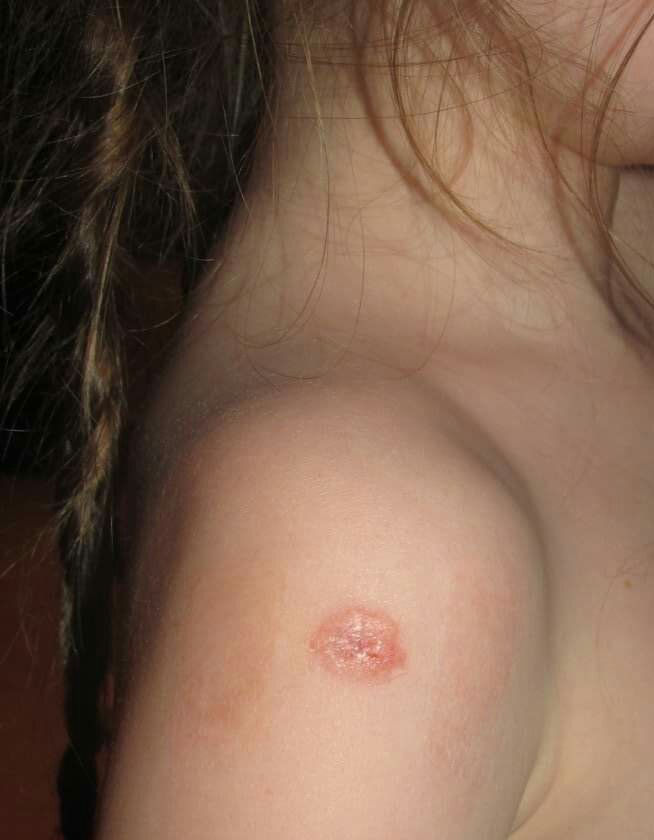
Photo: The day before the wide excision surgery
…
Tuesday 27th Feb 2018
As I write this, Jess is in theatre.
We left home at 4.30am. In the snow. The motorways were snowy and slow. As we got near to Maidstone, everything ground to a halt and we crept along in the snow, wheels slipping on the ice underneath. The windscreen was filthy, and the screen wash or the jets must have been frozen solid because nothing was coming through. I was actually thankful when, every so often, a truck overtook me and kicked up a load of spray, because at least it allowed me to clear my windscreen for a moment. Most of the way the thermometer on the dash said -2, -3 or -4.
Once we were onto the M26, the road was clearer, the verges less snowy and it had actually stopped snowing. We stopped at Clacket Lane services to switch on the sat nav and splash some water on the windscreen to clear off the ice and grime.
I stopped again just after we came off the M25 and began heading into London. The traffic was heavy, not helped by roadworks that took the two lanes down to one, and as the time went on, the roads got busier.
At last we arrived at the hospital car park, and walked around to the main entrance, went in and found out way to the ward.
It was 7.45 when we arrived.
The anaesthetist was the first to come and talk to us. He was young and a bit jittery, which didn’t help my nerves, and Jess found it hard to answer his questions so I did most of that. He reassured us that she could use the gas to go to sleep instead of the injection.
Next a nurse, Sharon, told us that Professor Powell would be over to speak to us soon, and sure enough, he arrived with a couple of other men. He used a black marker to draw the outline around her spot, and a big black arrow pointing to it. He reminded her what we are planning to do, and put her at ease again. Another consultant sat beside me and talked me through the consent form. I checked with him about what we should do if the wound wasn’t healing very well (go to gp) and signed the form.
Jess was smiling, but quiet.
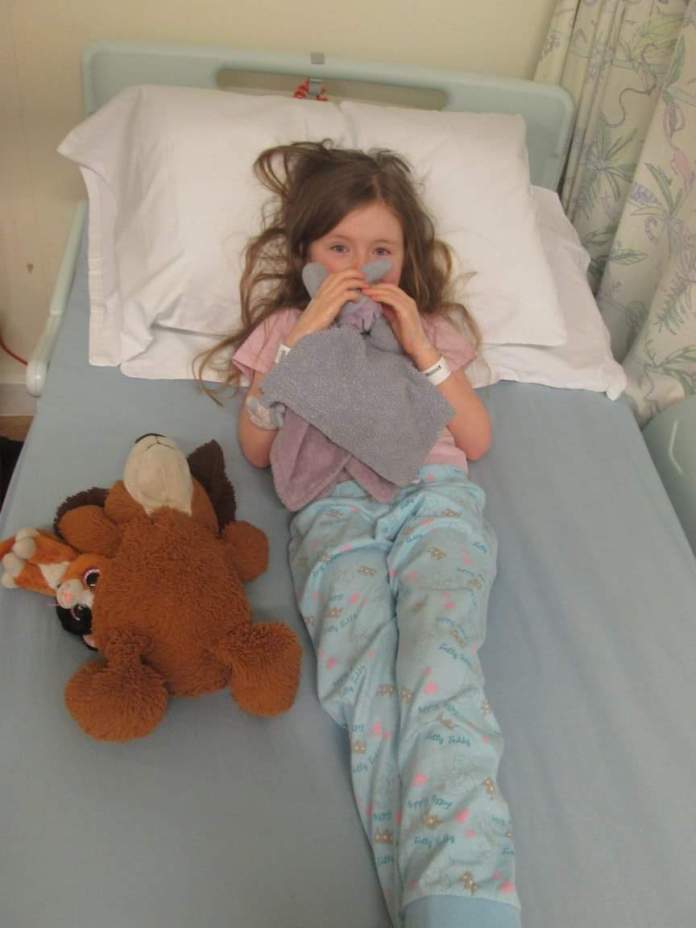
Sharon, our nurse, was great. She came to talk to Jess and do observations. She walked us to the place to be weighed and measured. Then she walked us back to the bed. She put the thermometer under jess’s arm, put the clip on her finger to check her oxygen, took her blood pressure and pulse and then asked all the questions she needed to. Things like allergies, illness, wobbly teeth. Jess proudly showed off her wobbly tooth. I took a couple of photos.
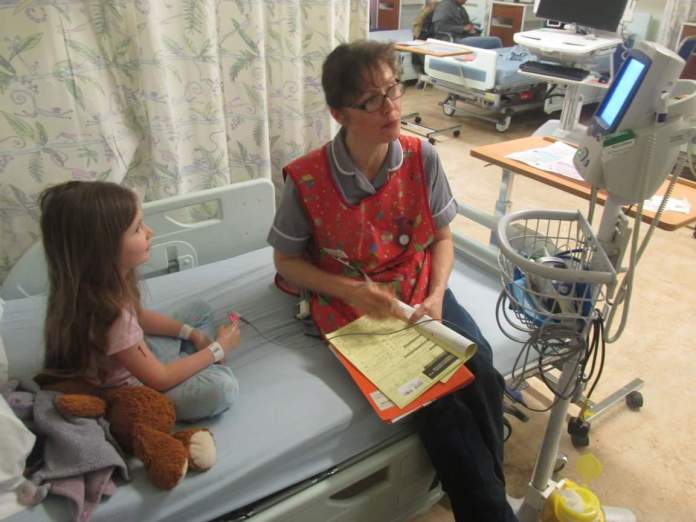
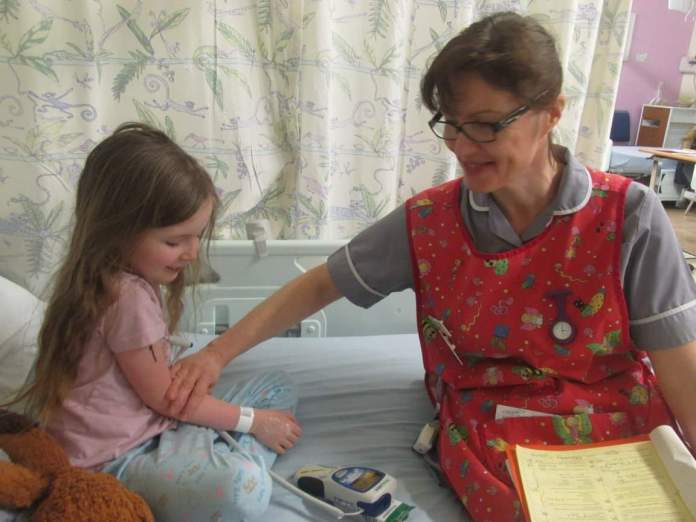
She put wristbands on Jess’s wrists and said she would print some off for her 3 teddies as well. That was Doggy, Eeyore and Tauri. She brought over a gown for Jess to wear to theatre and Jess was pleased to see it was a pretty fabric one instead of a white papery one. And she was pleased that Sharon said she can keep her pants on.
Once Sharon had finished all that, she said we wouldn’t be waiting long, as they were planning to start theatre for the day soon after 9 (it was about 8.30 by this time). I spotted the sign above the bed showing how to get free WiFi, so Jess was happy on her tablet for a bit and I messaged Daddy and sent him a photo. Jess was being super brave. She didn’t seem worried at all.
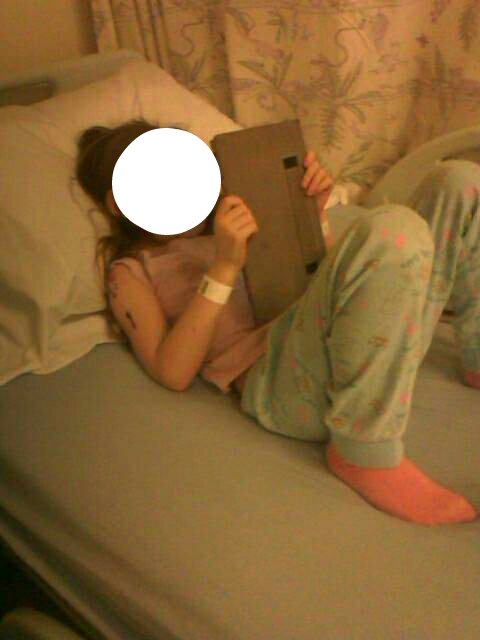
We looked through the chart that was at the end of the bed, that showed what role all the different staff had, according to their shirt colours. We decided Sharon must be a “Deputy sister or charge nurse” but Jess pointed out that the band around her collar and sleeve were white instead of red, so we weren’t 100% sure.

A lady, whose name I can’t remember, came and introduced herself as a play therapist. She asked Jess questions, but to be honest, by now, having been asked the same questions over and over, Jess had had enough of answering. She reminded us that there is a playroom and said to let her know if we need anything. Jess was happy just playing on her iPad, so she went away.
At about 9.20, the anaesthetist came and told us they were ready. Sharon pulled our curtain round, so we could get Jess into her gown. I put her hair into a band. Sharon and one other nurse came to check Jess’s details again, and put bands on Doggy, Eeyore, and Tauri. Jess decided she’d keep Tauri in theatre with her, and I’d look after the other two. I picked up the blanket, Jess put her Crocs on, and we followed Sharon round to theatre.
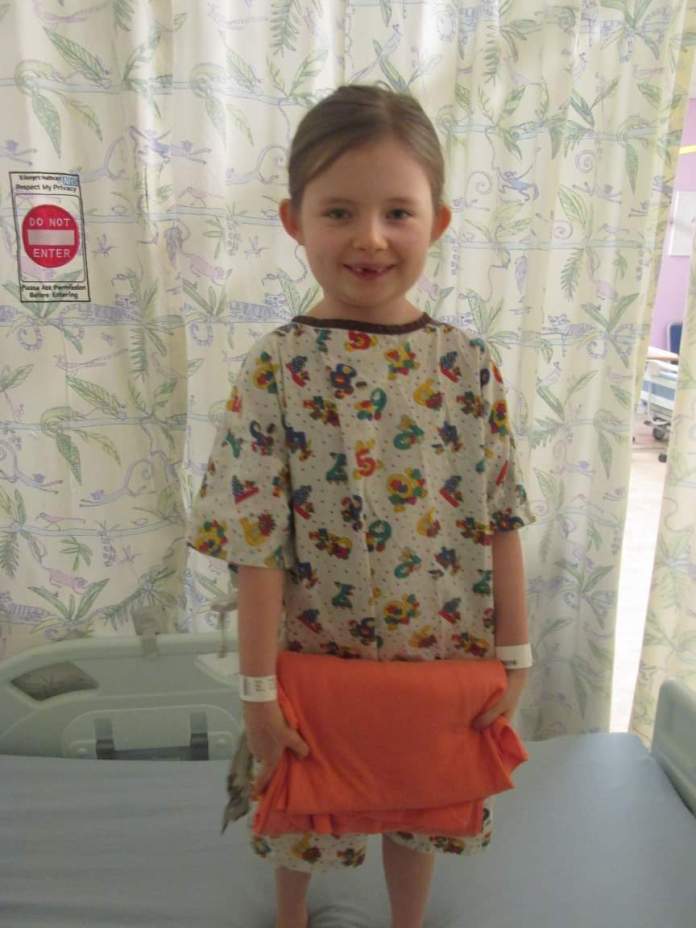
We walked down a corridor with lots of staff coming and going, and past a couple of prepping rooms before we reached ours. The anaesthetist and another man and another lady were already in there.
They asked Jess to jump up onto the bed, did all their questions again, took her shoes off and handed her the mask to breathe into. They showed her the balloon, a green balloon with a hole in the top, that the nurse held up. I sat on the edge of her bed and put my hand on her tummy. I told her to blow up the balloon and well done, and nice big puff, and good girl Jess, you’re doing really well. The nurse asked her to try to make it squeak with a really big puff. Her eyes were beginning to close, and then suddenly she pushed the mask away, pulling both hands free to grab it and push it away from her face. Suddenly she was agitated and fighting it. I reminded myself that it’s her body’s natural reaction. The anaesthetist reassured me that she won’t remember it, and even though I’d read that it is completely normal, it was still hard to watch. Then her eyes closed and her hands went still.
“Ok, Mum, she asleep now,” said the anaesthetist, and Sharon said to me, “OK. Let’s go.”
“How do you know she’s properly asleep?” I asked, terrified that they might start the operation while she was still conscious. Sharon reassured me, “She’s definitely asleep and they won’t do anything until they are certain.”
I gave Jess a long kiss on her cheek and said “I love you, Jess,” then I came out. Sharon led me to a chair in an area outside that corridor. And I cried. She told me it was normal to feel emotional, and that it always gets you. She brought me a pager, and told me where to come back to when it beeped. So now I’m waiting. An hour has already passed. They said she’d probably be asleep about an hour, so I’m expecting a beep anytime now.
Part 2 Coming Soon!
(But just to reassure you, we are now 3.5 years into the 5 year follow-up, and all good at the mo 👍 Phew!)
©monkeymum.blog
Follow me on Facebook. Hope to see you there!

